
DIVERSIFYING PORTRAITURE
Fourteen women honoured RESEARCH
Astronomy, climate, malaria vaccine
MAIN SITE
Planning permission granted


Fourteen women honoured RESEARCH
Astronomy, climate, malaria vaccine
Planning permission granted
I can scarcely believe this is the fifth time I am writing an introduction to Observatory. It seems no time at all since I joined Green Templeton as Principal and yet so much progress has been made. We have ambitious plans for the future of the college and are on the cusp of launching a major fundraising campaign to deliver them (see page 32). It will be an interesting year ahead, building on the hard work of the past few years to put our vision of the college’s future together.
This issue reiterates the spotlight we threw on exceptional women who have contributed to the successes of Green Templeton, most obviously exemplified by the portrait project for International Women’s Day in March (see page 6). The stunning portraits by talented photographer Hannah Veale were exhibited in the Stables Gallery and are now hung in the Observatory Common Room and the Lecture Theatre.
We have ambitious plans for the future and are on the cusp of a major fundraising campaign
Women now make up a significantly larger proportion of the Governing Body of the college than when I arrived. In fact, we have moved from 26% to 43% in just four years. We remain committed to our objective to increase the proportion of women and Black and Minority Ethnic fellows, and Governing Body Fellows in particular.
Our interview this time is with Associate Fellow Mehreen Datoo, who is in the 2024 TIME100 Next list of emerging leaders (see page 16). She talks about the development of the R21/Matrix-M™ malaria vaccine in Oxford and her career in infectious diseases.

As part of our campaign for the conservation and decarbonisation of the Radcliffe Observatory we have established strategic links with Astrophysics and are pleased to have seven new Research Associates as members of the college community, including Heloise Stevance (see page 23).
The 2024 Green Templeton Lectures, spearheaded by Research Fellow SanYuMay Tun, focused on planetary health (see page 28). These lectures continue to engage audiences from across and beyond the college community. The college looks forward to the 2025 series on sustainability education organised by Research Fellows Mark Hirons and James Robson (see page 22).
The successes of our alumni provide the basis for the college’s impact on the wider world. During the year we have stepped up our alumni engagement, for example, by visiting those based in Asia with Director of Development Ceri Butcher in May. It is very good to see a range of our alumni throughout this issue.
Finally, 2024 marked the end of the term of appointment of Rebecca Surender as Vice Principal. On behalf of the entire college, I would like to thank Rebecca for her guidance in that role, and support to me personally. I look forward to now working with Jonathan Reynolds who has succeeded her.
Sir Michael Dixon
Principal
January 2025
Cover photo: Josephine Nana Afrakoma Agyeman-Duah (DPhil Women’s and Reproductive Health, 2018) by Hannah Veale.
Photography including by Eniola Awodiya, Ceri Butcher, Jun Cao, Georgia Hole, Clemens Jarnach, Ian Jones, Nick Parrott, Harriet Quint, Hannah Sale, Sophie Schirmacher, Ruth Scobie, Kirsty Taylor, Sarah Taylor, The Battle to Beat Malaria – Wingspan Productions, Monika Tomiczek, Hannah Veale, Margot Richard on Unsplash and 愚木混株 cdd20 on Unsplash.
Green Templeton College does not have an institutional view and the opinions expressed in Observatory are those of the authors.
Comments and suggestions in response to this issue of Observatory are welcome.
Please contact the editor Nick Parrott at nick.parrott@gtc.ox.ac.uk
Registered charity number 1142297 © Green Templeton College 2025
Produced by B&M Design and Advertising www.bm-group.co.uk
Find out about the Templeton legacy, college’s Green Impact Beyond Gold Award, student exchange with St Edmund’s at Cambridge and Guest Suites now available to book online
International Women’s Day was marked by honouring 14 exceptional women in new photographic portraits
Associate Fellow on malaria vaccine success, her life and career to date and her association with college
Printed on Edixion Offset:
ECF Pulp, FSC® Certified and EU Eco Label. Green Star Rating – 4
Celebrating college citizenship from the Black Students’ Society to FemTech, from neurodiversity to the Boat Club and GCR leadership
Research Fellows Mark Hirons and James Robson on the theme of the Green Templeton Lectures 2025
Astronomers and their machines
Research Associate Heloise Stevance on the importance of trust between scientists and their machines
From the Boat Club in China to nursery children in the greenhouse, from celebrating scholarships to a welcoming Andean ceremony
Eight alumni reflect on their time in Oxford and subsequent career journeys working towards a sustainable future
Report on the Green Templeton Lectures 2024 on planetary health and its importance for social equity and prosperity
Donor-supported BSL training, Principal’s Circle dinner discussion, and career advice in Australia
Our Director of Development on exciting plans, reinstating the Development Committee, and meeting alumni and supporters in the UK, Asia and
Updates on a project to carry out muchneeded conservation work, increase the building’s environmental efficiency, and improve its accessibility and
An insight into the full case for giving to the college, which is being developed for a major fundraising campaign to begin in 2025
Governing Body changes, new books and two much-loved college members get
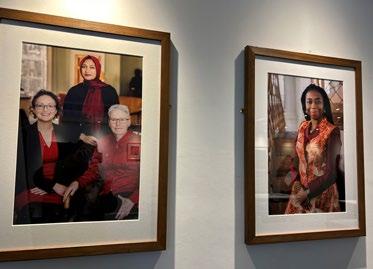
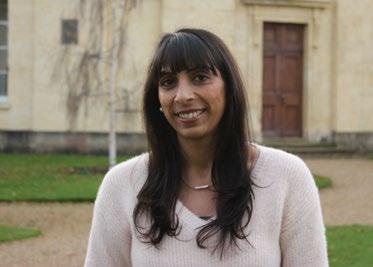
Low-carbon formal dinner, summer school, Aurora borealis and an ox on the south lawn of the Radcliffe Observatory
Asia tour, thanking supporters, marking the 40th anniversary of Templeton College, Malaysia alumni group, and welcoming clinicians celebrating the 50th anniversary of their training
Accommodation Services Manager Emirose Cottington on her role, plans for new accommodation in college and life outside
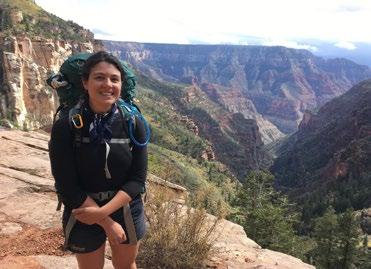
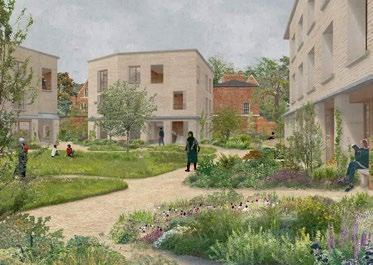
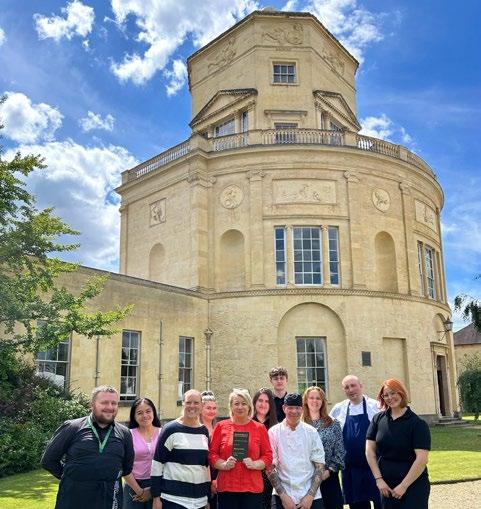
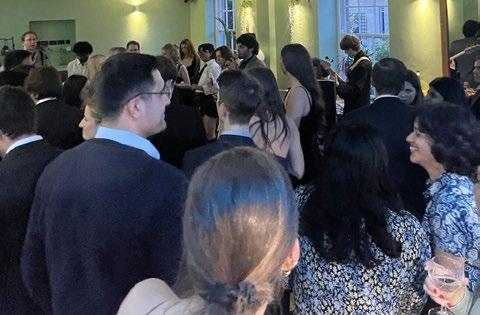
The Graduate Common Room (GCR) welcomed students from Green Templeton’s sister college at Cambridge, St Edmund’s, for a full day and night of festivities in May. Activities included a city and college tour, friendly speed dating, a formal dinner and a bar night with live music.
The day was the second leg of the 2024 exchange; the first being a fabulous trip of a coach full of students visiting Cambridge in March. GCR President Alexander Hasson (DPhil Oncology, 2022) said: ‘It was excellent to reignite the relationship between St Edmund’s and Green Templeton. The exchange was an invaluable social and networking event.’
This regular initiative was again generously supported by an individual donor to college.
Green Templeton has achieved a Green Impact Beyond Gold Award for the second year running. The award was announced at the ViceChancellor’s Sustainability Awards in July.
Green Templeton is one of only two colleges to achieve this level in the annual Green Impact Awards. The award recognises Green Templeton’s commitment in maintaining and improving on existing sustainable initiatives, as well as introducing new projects on energy saving and working with local Oxfordshire farmers.
This award came just weeks after the college announced its new Climate Action Policy (2024 to 2035), agreed by Governing Body in June. The policy will be key to driving Green Templeton’s sustainability agenda and shows externally both commitment and progress.
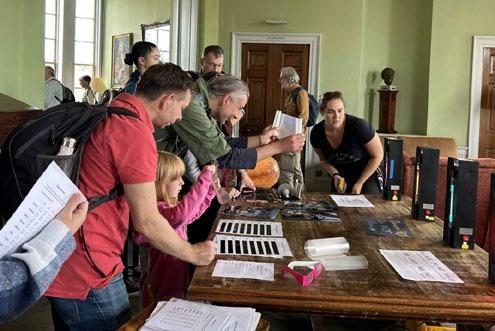
Nearly 1,000 people visited Green Templeton as part of Oxford Open Doors in September.
For the second year running, Green Templeton was delighted to showcase its connection to the field of astronomy by partnering with the Oxford Astrophysics sub-department. Visitors had the opportunity to explore the universe through hands-on activities and demonstrations, as well as exhibits on exoplanets and the solar system.
There were plenty of family-friendly activities to enjoy and discover, including a treasure hunt and space-themed arts and crafts.
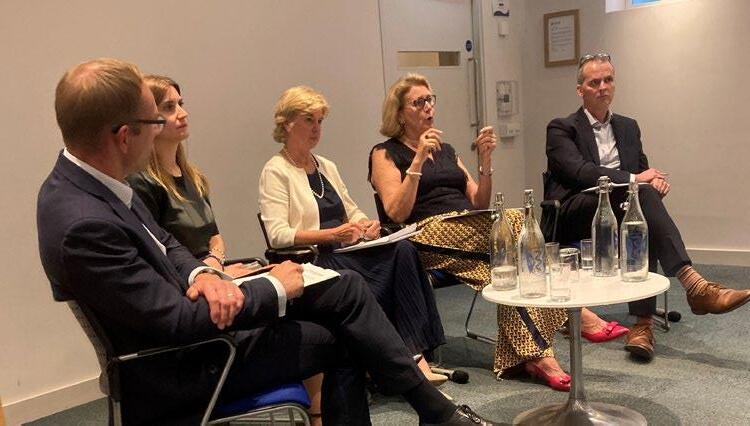
As part of the Meeting Minds 2024 programme in September, a thought-provoking panel reflected on the 40 years of the Templeton legacy.
The discussion brought together fellows Professor Sue Dopson, Henrietta Jowitt and Professor Michael Smets with Professor Maja Korica (DPhil Management Studies, 2006) and staff member Dr Pete Jordan, who has written extensively about Sir John Templeton’s worldview, to reflect on Templeton College’s innovative impact on leadership and its continuing influence on society.
The panel highlighted the fact that the college was ‘designed for conversations’, fostering collaboration and ethical, entrepreneurial leadership – a vision that continues to shape Green Templeton.
Reflecting on leadership for the future, the panellists discussed how businesses need to balance profitability with broader societal responsibilities, including responding to global challenges such as inequality and environmental sustainability.
The event also fostered a forward-looking dialogue on the importance of sustaining recent advances in inclusivity and leadership development.
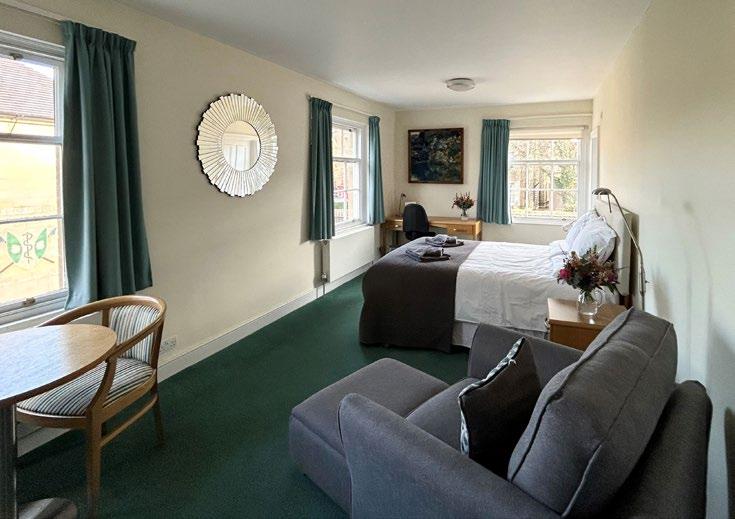
Green Templeton College offers the opportunity for a unique stay close to the historic Radcliffe Observatory in one of our two onsite guest suites. This is a great option for alumni looking to revisit college as well as a way for new visitors to soak up the atmosphere of the Oxford colleges from a central location.
The Patrick Guest Suite is on the ground floor of New Block, and the Walton Guest Suite is on the first floor above the library. Both have king-size beds, ensuite facilities and kitchenettes. gtc.ox.ac.uk/accommodation
Green Templeton College was proud to mark International Women’s Day 2024 by honouring 14 exceptional women from across the community through a series of nine stunning photographic portraits.
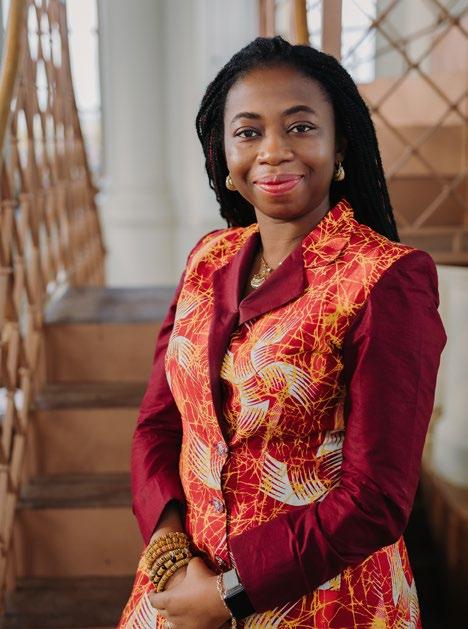
Josephine Nana Afrakoma Agyeman-Duah (DPhil Women’s and Reproductive Health, 2018) is featured on the cover of this year’s magazine.
Josephine is an international health professional from Ghana whose doctoral research developed neurodevelopmental assessments of preterm infants. She has worked with international organisations, including the WHO, to improve maternal and child health. She was Green Templeton’s first Black Students’ GCR Representative and the founder and first president of the college’s Black Students’ Society.
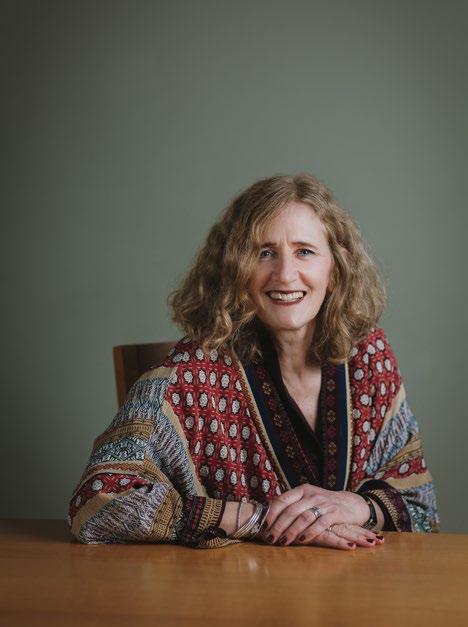
Alison Franklin, Academic Registrar
Alison manages the College Office, supporting students from admissions to graduation. She has worked for Green Templeton since December 2012 and has been Academic Registrar since 2018. Alison is also the college welfare lead and disability coordinator.

Dr Helene-Mari van der Westhuizen, (DPhil Primary Health Care, 2018)
Laiba Husain, (DPhil Translational Health Sciences, 2022)
Professor Trish Greenhalgh OBE, Governing Body Fellow
Helene-Mari is a South African medical doctor with a doctorate in tuberculosis prevention in health facilities.
Helene-Mari founded the NGO TB Proof and her research on TB and COVID-19 prevention has been relied on for national and international policy. Trish Greenhalgh was one of her DPhil supervisors, and Helene-Mari now supervises several students herself.
Laiba is a 2019 US-UK Fulbright Scholar and THIS Institute Research Fellow, currently working on her DPhil study, supervised by Trish Greenhalgh, on the scale-up of virtual healthcare platforms and the implications on digital health disparities.
Trish is a Professor of Primary Care Health Sciences whose research analyses the organisation and delivery of health services, including responses to COVID-19 and the introduction of remote healthcare.
Professor Sue Dopson, Governing Body Fellow
Professor Xiaolan Fu, Governing Body Fellow
Professor Rebecca Surender, Governing Body Fellow
Sue is Deputy Dean for People and Equity, Diversity and Inclusion at the Saïd Business School, and Professor of Organisational Behaviour. Her research focuses on innovation and change in the public and private sectors – most recently, women’s leadership and the experiences of minorities who pursue academic careers.
Xiaolan is Professor of Technology and International Development and Founding Director of the Oxford University Technology and Management Centre for Development. As an expert on innovation, science and technology capabilities in the developing world, she has been consulted by the UN, the World Bank, the OECD and the Chinese government.
Rebecca is a Senior Research Fellow at the Department of Social Policy and Intervention, specialising in health and social policy in developing countries, and Associate Head of the Oxford Social Sciences Division (Graduate and Research Training). She was the university’s Pro-ViceChancellor for Equality and Diversity from 2014 to 2021, and is a member of Advance HE’s EDI Strategic Advisory Group.

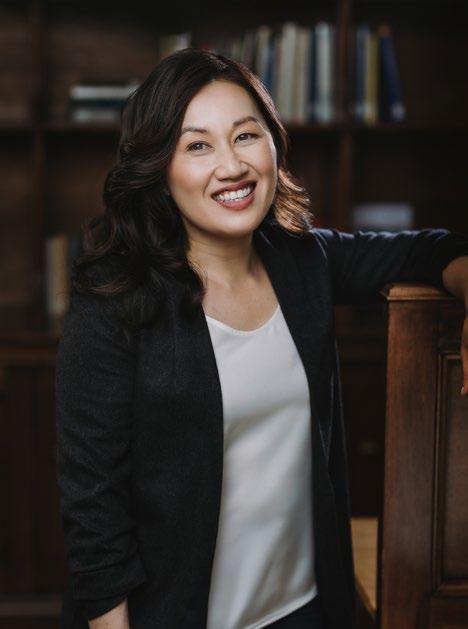
Selina Kaing (MBA, 2006 at then-Templeton College)
The daughter of Cambodian refugees, Selina has performed transformational work with some of the world’s top companies and now leads technology services in Google’s global procurement team. She is the chairwoman of the United States Fencing Foundation trustee board, and is a strong advocate for diversity in sport, leadership and business.
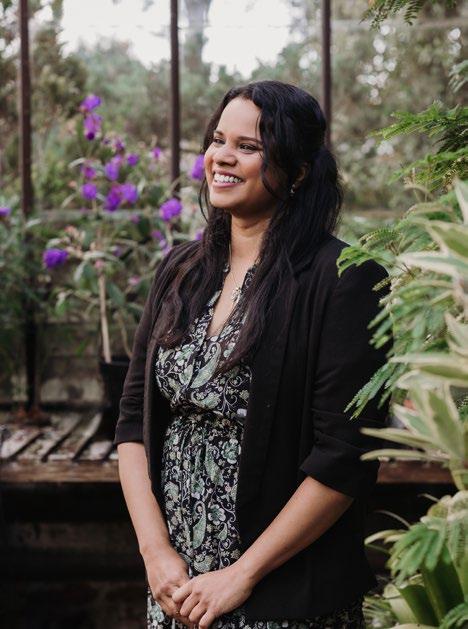
Dr Shobhana Nagraj (DPhil Women’s and Reproductive Health 2017), Associate Fellow
A clinician and researcher in maternal child health working to promote innovation in global surgery and global health, Shobi has also set up projects with Oxfordshire community organisations to reduce childhood malnutrition and health inequalities locally.
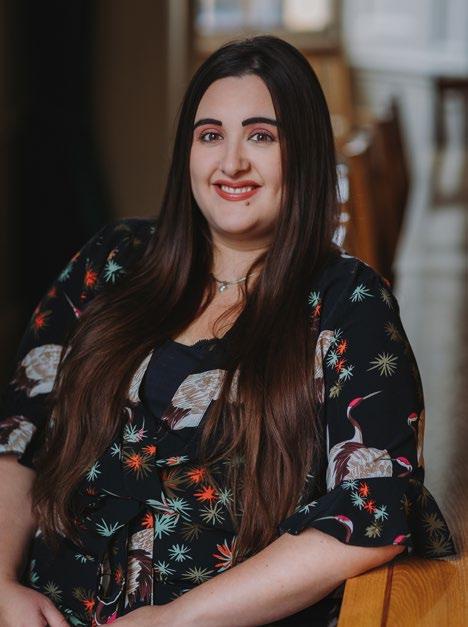
Hannah is a long-standing member of the college catering team. As such she has interacted with generations of students and other college members at the hub of the community, playing a pivotal role in the college’s reputation for hospitality and creating a welcoming environment for all.
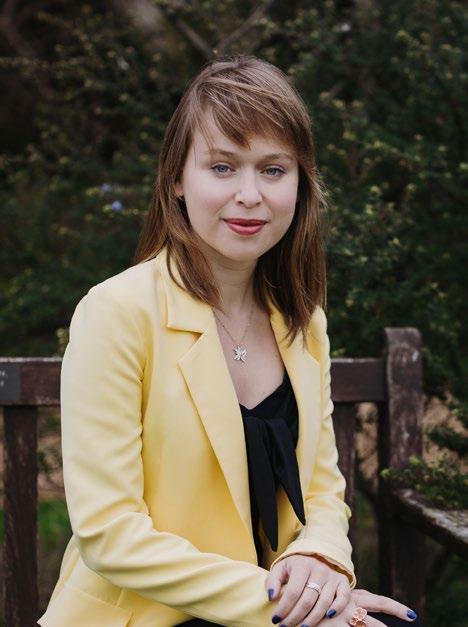
The first Ukrainian to graduate from the Blavatnik School of Government, a political scientist, an artist and a political communications specialist, Lisa became an elected member of the Ukrainian parliament in 2019.
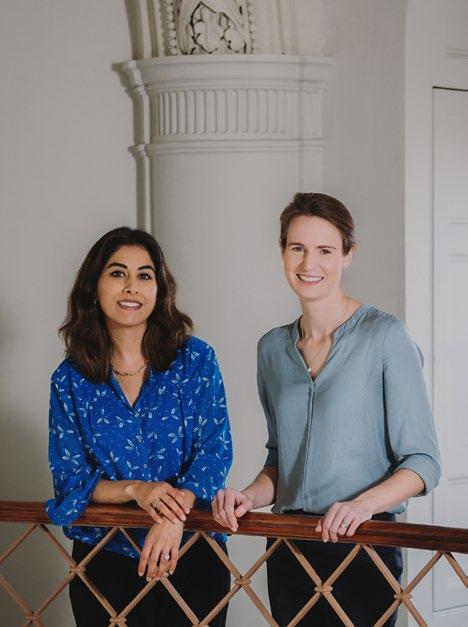

Dr Radhika Chadha and Dr Sheila Lumley, Senior Doll Fellows
Radhika and Sheila are the first women (and job-sharers) to run the medical teaching programme. They do this in conjunction with their work as clinical academics in the fields of general surgery and infectious diseases respectively.
Oxford-based photographer Hannah Veale was tasked with capturing images that blend timelessness with a modern flair, embodying the college’s progressive and contemporary spirit.
Hannah said of the commission:
‘It’s been a privilege to contribute to this project, which aims to redress the balance of representation within the college’s visual history, celebrating the joy and passion these women bring to their fields.
‘I wanted these portraits to do more than just capture faces; my aim was to create images that put each person in a context that spoke to their connection with the college’s environment.
‘By using predominantly natural light and authentic settings, I hoped to reflect not just the individuals but also the spirit of the spaces they move in.’
The college is grateful to Dr Ruth Scobie, Caitlin Pawulski and Sarah Taylor for their time spent in administering this project.
Nominated via an open call to the college community and generously supported by donors to the college, the portraits showcase some of the diverse talents and contributions of women at Green Templeton, and their work advancing gender equality in college and the wider world.
Nominees must:
• have been current or former students, fellows or staff at Green Templeton College (or Green College, Templeton College or the Oxford Centre for Management Studies), or have an equivalent strong link to the college
• identify as women
• have actively contributed to the success, values or profile of Green Templeton, either within the college community or in society more widely through their research, careers or other action
• be alive at time of nomination
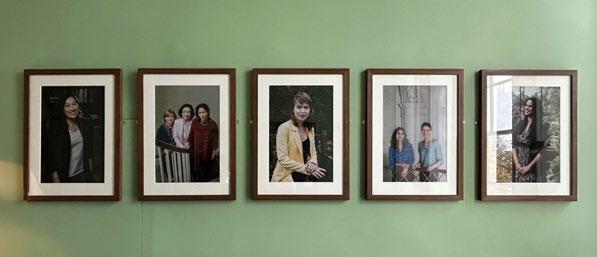

The portraits were launched on Friday 8 March, and were displayed in the Stables Gallery throughout the spring before finding permanent homes in the Observatory Common Room and the Lecture Theatre.
Visitors to college are encouraged to come and see them.
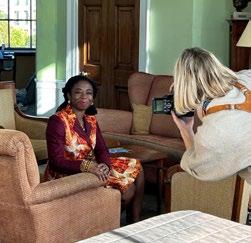
A committee made up of a crosssection of the college community reviewed nominations.
• Alison Stenton, Senior Tutor and college Equality and Diversity lead (Chair)
• Sonia Antoranz Contera, Governing Body Fellow and member of the Green Templeton Equality and Diversity Forum
• Lady Deborah Dixon, Global Editorial Director, Science and Medical Journals, Oxford University Press
• Tori Ford (DPhil, Primary Health Care, 2021)
• Taiwo Olawole (Master of Public Policy, 2022)
• Caitlin Pawulski, Deputy Academic Registrar and member of the Green Templeton Equality and Diversity Forum
• Sarah Taylor, Digital Communications Officer and member of the Green Templeton Equality and Diversity Forum
Marwa M.A. Elbasheer (DPhil Population Health, 2020) Marwa was instrumental in establishing the Black Students’ Society and was editor-in-chief of the society’s journal, offering a platform for colleagues to share their perspectives. Through this initiative, Marwa not only encouraged writing but also heightened awareness within the college community about issues pertinent to Black students and alumni.
She also appeared on the panel at an Atlas workshop, giving advice to students thinking about future doctoral study, and regularly contributed to the college EDI Forum as GCR Black Students’ representative. Marwa curated an environment of support and understanding at college that will be long lasting.
These annual awards honour students who have gone beyond the call of duty and responsibility to contribute to the college in three categories: Academic, College Citizenship and Sport. Congratulations to the winners and all those highly commended.

Trishna Desai (DPhil Population Health, 2018), as a key leader in the Global Health Society, was committed to the initiative and its academic success. She promoted a friendly environment, and helped to organise online and in-person events, discussions, socials and trips for students interested in global health across college and the university.
Trishna dedicated a great many hours to the society, and also helped to organise and deliver two symposia on Global Child Health at Green Templeton. As a college ambassador for OxWEST (Oxford Women in Engineering, Science and Technology), she invited college members to present and participate in initiatives to promote women in STEM across the university.
Vithushanan Ketheeswaranathan (Clinical Medicine, 2021) led the organisation and implementation of an early teaching programme for fourth-year medical students, while balancing the demands of his own busy final year as a medical student. This involved recruiting more than 15 finalyear medical students as tutors, advertising the sessions to fourth years, and ensuring that any gaps in the weekly teaching were filled to provide equal opportunities and practice for every student.
Vithushanan personally mentored a group of five fourth-year students through the programme, offering tailored support and guidance to enrich their learning. This early teaching for fourthyear students will benefit them throughout their clinical years.
Christiane Hagel (DPhil Clinical Medicine, 2019) was an energetic driving force in organising the Human Welfare Conference 2024, as well as a series of activities and events as President of the Oxford FemTech Society. She was actively engaged with other academic projects, including the Oxford Global Health Society and the Global Child Health MiniSymposium (where this year she won the popular vote prize for her research poster ‘One does not simply design a dashboard: Understanding performance dashboards for quality of newborn care efforts in Kenyan hospitals’). Christiane gave an enormous amount of time and energy to bringing high-quality research events to the college, and is frequently involved in student academic activities.
MacKenzie Isaac (DPhil Population Health, 2023)
MacKenzie embraced the role of GCR Vice-President for Equality and Diversity and went above and beyond to support students at college, ensuring that events and activities are inclusive, and that they cater for the diversity of the student body and support students’ welfare and well-being.
MacKenzie secured financial support from the GCR to expand the library collection on mental health to include a comprehensive range of books on neurodiversity. She took the role beyond being predominantly about advocacy, and introduced many practical initiatives with enthusiasm, sensitivity and diplomacy.
Emily Rae Foreman (MPhil Comparative Social Policy, 2022) championed the Allotment Club since joining the committee in 2023. She made weekly visits, facilitated new hands joining the plot, handled the social media engagement and ran events both in college and off site, including a re-potting day for students and a wreath-making event in December.
Michelle Yeung (DPhil Translational Health Sciences, 2022) invested significant time and effort in leading the committee to organise the GTC Ball 2024. The Ball is a significant contribution to the student experience in college because it provides a quintessentially Oxford experience and a fitting farewell for those finishing.
Katherine French (MBA, 2023) and Kathryn Pundyk (MSc Global Governance and Diplomacy, 2023)
Despite the challenges of river closures due to the high water this academic year, co-captains Katherine and Kathryn have grown the women’s boat squad considerably and kept enthusiasm for rowing high despite the lack of water time.
Taking on the role of rowing captain involves an enormous amount of time and effort. The role involves a large amount of administrative work, organising river outings, training sessions, as well as motivating individuals to attend. Much of the success this year is a result of Katherine and Kathryn’s leadership, which has helped the squad maintain a high level of sports-related success while creating a kind, supportive space for female athletes of all ability levels at Green Templeton.
Josefina Orliacq (DPhil Population Health, 2021). As Boat Club Kit Officer and a long-standing member of the club, Josefina introduced new kit products and negotiated with vendors to offer more affordable items for club members. She dedicated many hours to designing items, managing club orders and ensuring correct delivery. Josefina also arranged for new club kit that can be borrowed so team members do not have to purchase the kit for races.
Patricia Lamirande (Doctoral Training Centre: Sustainable Approaches to Biomedical Science, 2021). As Green Templeton Boat Club Secretary and a rower in the women’s first boat, Patricia is a positive force who brings energy, focus and organisation to the club, helping to foster a supportive and welcoming community. She also managed the college community choir –securing funding and organising the weekly sessions.
Alexander Hasson (DPhil Oncology, 2022)
As GCR president, Alexander accepted the value of quality over quantity when it comes to what the GCR can do and accomplish within an academic year. He has been a great leader and actively contributed to wider collegiate conversations and activities to ensure that student voices are heard.
Alexander worked hard to review and update the GCR constitution to make sure that the roles, remits and responsibilities are flexible and provide a clear platform for the future of the GCR. He has also ensured that engagement and support will be continuous between one GCR and the next. Alexander seeks out opportunities to support peers academically, emotionally and socially.
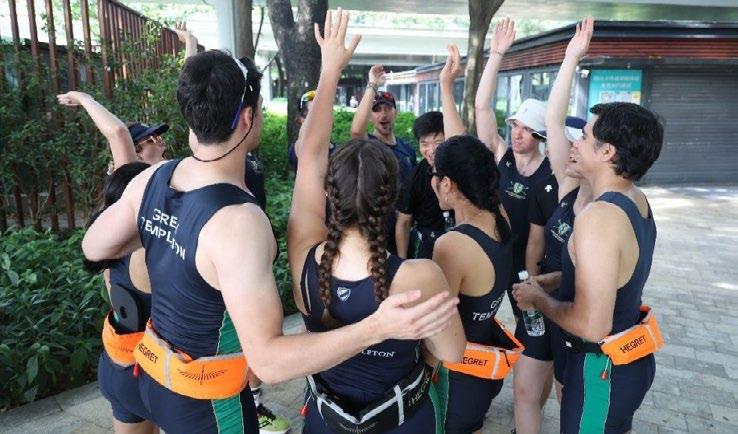

undertook a
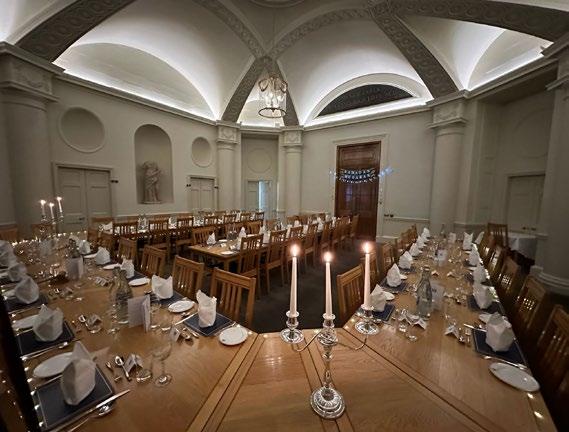
Graduate Common Room Entertainment Representatives organised a formal dinner in anticipation and honour of the Islamic holy month of Ramadan in March
Clemens Jarnach (DPhil Sociology, 2018) won this year’s photography competition on the theme of Peace with ‘Women protesting’ in June. The competition is made possible thanks to the support of the late neurologist and Common Room Member Dr Elman Poole
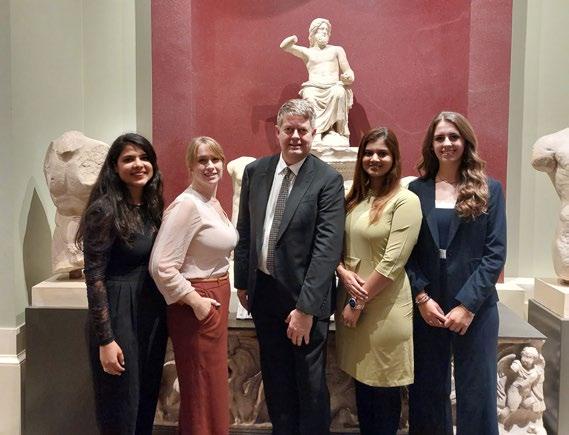


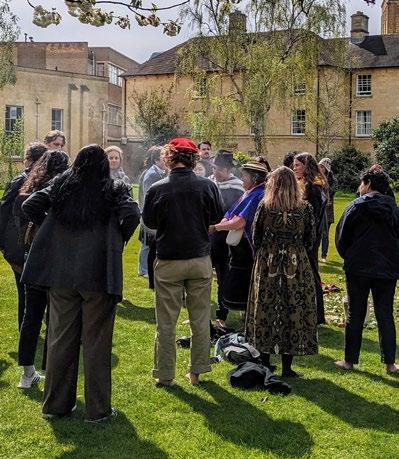
a tour of the gardens and helped them to plant some seeds in April
Top right: ‘Then vs Now: Observer’s House and McAlpine Quad’ from @greentempletoncollegelibrary on Instagram in October
Centre right: A welcoming Andean ceremony organised by Malvika Gupta (DPhil International Development, 2017) took place at college as part of the conference ‘Thinking with and alongside Critical Indigenous Scholarship’ in April
Bottom right: Vincent, our resident feline friend, adopted the college as his home in 2020. Named after the artist Vincent van Gogh because he is missing part of his ear, Vincent has been charming students and visitors since he arrived


A massive milestone in the fight against malaria was reached in 2024 when a new vaccine (R21/Matrix-M™) was deployed, following World Health Organisation recommendation. The vaccine was developed at the University of Oxford in partnership with communities across Africa, and produced at scale by the Serum Institute of India. It was the subject of a major documentary, The Battle to Beat Malaria, featured on the BBC.
Dr Mehreen Datoo is a central member of the Oxford team and was named on the 2024 TIME100 Next list of 100 emerging leaders. She is an Associate Fellow at Green Templeton and a Clinical Lecturer in Infectious Diseases. Observatory sat down with Mehreen to ask about her life and career to date, the vaccine development, and her roles in the college community.
Could you start by telling us a little about yourself?
I’m not one of those people who grew up wanting to be a doctor. In fact, I always wanted to be a teacher. I loved science – biology and chemistry were my favourite subjects at school – and when I was 16 or 17 my friends and I got the opportunity to do a short ’Insight into Medicine’ course at Nottingham University. I thought it would be a couple of days away, a bit of fun, but we did some cool things, and when I came home I told my parents I wanted to apply for Medicine.
My parents were very surprised, and asked me a lot of questions. They reminded me how long medical training can be, but ultimately they were supportive. Given my ethnicity, there can be a stereotype that everyone is going to be a doctor or a professional, which is not true at all. There are no medics in my family, but my parents helped me find people to ask more about the career. I ended up securing a place at King’s College London to study Medicine.
You mentioned your ethnicity. How would you characterise it?
It’s a complicated answer. I’m British born and bred, but my family have raised me with the faith, values and culture of their backgrounds too. My parents were born and brought up in Tanzania before moving to the UK. They studied and worked in the UK, deciding to settle here in the 1970s. My sister and I are first-generation British.
How did you get into tropical medicine?
When I was in medical school there was an option to do a BSc in a year, sandwiched into your medical degree. At that time, there was a BSc in International Health and Policy in Leeds.
It is fair to say that I hadn’t appreciated how much additional debt I was taking on but living in Leeds was a lot cheaper than London, and the major attraction for the course offered by the University of Leeds was the opportunity to do your research project abroad.
So I moved to Leeds for the year, and I did my research project in Uganda. When I was on a short holiday to see the gorillas I got malaria. (The gorillas were spectacular, by the way!) Luckily, after a couple of weeks in hospital, I was able to return home and I was okay after spending a lot of that summer recuperating in my parents’ garden.
Because of that experience and because I had travelled a lot with my parents, infectious diseases interested me. So, after completing my second foundation year as a doctor, I did a short diploma at the London School of Hygiene & Tropical Medicine.
You then went to work overseas?
Indeed. As an early-career doctor I went to do medical outreach work in some rural clinics in Zambia with an NGO called On Africa. We had a base in Livingstone, but Monday to Thursday we would go to different districts and work in community-run clinics. We would return to Livingstone each week on a Friday, spend some time recuperating, and then on Sunday,

Being interviewed in Bagamoyo, Tanzania
packed up meds and restocked our vehicle for the next week’s district. It was demanding but rewarding: I saw really sick people who couldn’t access healthcare in hospitals.
I vividly remember two children who were very ill with malaria. We thought that they were going to die, but with malaria treatment and good nutrition, they got better. The mother brought the children back a few weeks later; I didn’t even recognise them because they were so well. Early diagnostics, appropriate treatment and healthcare are key and sadly many people around the world still don’t have access to the basics.
That experience further reinforced the sort of career I wanted to have.
After that you moved to Oxford?
Yes. I applied for my further medical training at Oxford University Hospitals, though I spent my first year on rotation in Slough, west of London. It was a bit of a culture shock coming back to the NHS – for a variety of reasons, including the resourcing constraints and on
occasion because of the way junior doctors are treated. I struggled with the way in which access to healthcare was taken for granted, and interventions ignored.
However, I realised that if I wanted to make a bigger difference, I needed to obtain more experience and understand some of the processes better. I knew that I had to learn how to be a good doctor and then become a specialist in infectious diseases.
And then you started a research project?
Professor Adrian Hill advertised for a research fellow and I knew it was to work in malaria vaccines. I saw it as a great opportunity to understand a vaccine candidate that was being transitioned from the lab to the clinic. I hadn’t a clue what it involved when I started working for him, but Adrian and his team have taught me how to do a clinical trial from start to finish. The Jenner Institute has preclinical, laboratory and clinical facilities which are key to translating vaccines to reality, and some excellent people in various teams.
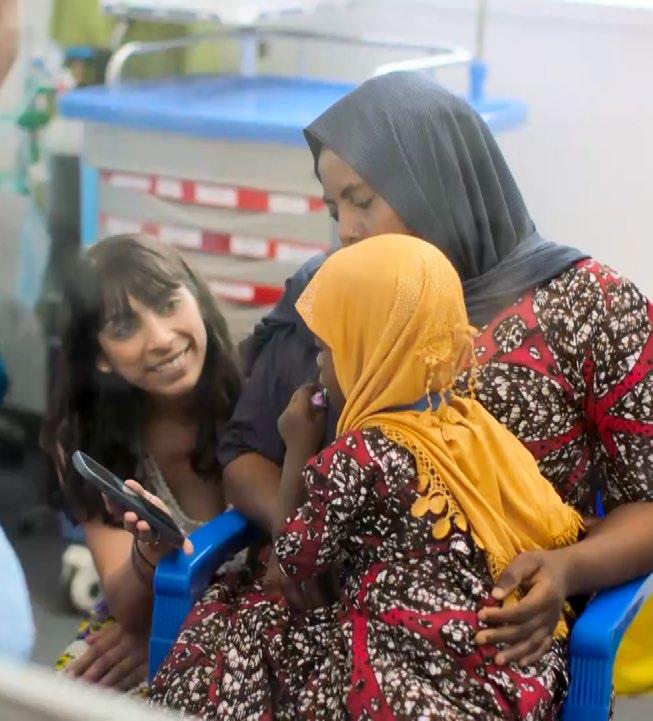
The clinical trial processes are detailed for a reason: you are about to test for a real-life disease and a potentially real-life cure. I learned how to design and draft a compliant protocol according to Good Clinical Practice for a clinical trial; I learned about the ethics and regulatory requirements and then I learned how to implement and run a clinical trial. For me, the real joy in the entire process was looking after the participants, who had bravely come forward to test our vaccine candidate – and for me, as a clinical doctor, this was also one of the easier parts of the job (well, most of the time).
Some of the best parts of my job are the ‘malaria challenges’. First, you give participants a vaccine designed to protect against malaria; second, you give them malaria deliberately through five infectious mosquito bites; and third, you monitor and look after them closely, because you have given them a potentially fatal disease. The challenges are excellent: it’s a huge responsibility but also amazing on a human level.
You get to know your participants really well because you spend about six months getting to know them; and you see or speak to them every day for three weeks, sometimes twice a day. This is because you counsel them, give them vaccinations, do the malaria challenge and follow up with them afterwards. The relationship with your participants is incredible. If you are fortunate enough, you can sometimes see exciting results too.
Did this form the basis of your DPhil? It culminated with the R21 vaccine. After giving these vaccines and doing a malaria challenge in England, we first took our vaccine to Kilifi in Kenya, to test if it was safe and induced immune responses in our target population of African children. And following encouraging results, we did the same in northern Burkina Faso, verifying that it actually protected against malaria. It was those stages of the trial that I worked on for my thesis.
It was the first time a malaria vaccine had shown vaccine efficacy of over 75%, which was the WHO target at that time. It was super exciting when the data was presented at an international conference, but we didn't know if anyone believed it. When it was published in The Lancet, it was in writing for all to see.
Then what?
The big problem with vaccines is that it’s not only about making a vaccine and testing it in phase 1, phase 2 and phase 3 trials to check if it works. We also need to be able to manufacture a vaccine at large scale and at an affordable price to reach those who need it most. And of course, through education, encourage people to take the vaccine (or bring their children for the vaccine).
We knew we could never manufacture millions of doses at the University of Oxford and to transfer the technology to the Serum Institute of India for mass manufacture would require complex negotiations. We also realised that you can’t necessarily use the same manufacturing process, and so we had to redo the initial phase 1 and malaria challenge trials.
After my DPhil, and because of these exciting results, I chose to stay in Professor Hill’s group to continue the clinical development of the R21 vaccine. Over the past few years, the work has really ramped up in terms of designing, writing and executing the phase 3 trial protocol, engaging the
collaborators in Africa, and leading from the clinical side with partners in the target communities. At the same time, we have been taking scientific advice from various stakeholders and international regulators, as well as continuously submitting data to the WHO for assessment to enable a policy recommendation and vaccine prequalification.
It was clearly a collaborative, multinational effort
It is critical to remember that although the vaccine was developed in Oxford, it was tested in Africa because that’s where the target population is. None of this success would have happened without the great teams that we have working tirelessly in Africa – and also the participants and their caregivers.
It’s the people who make the clinical trial: the participants and their caregivers have to want to be involved in the trial and do whatever is needed – attend their appointments, consent to vaccinations and the follow-up. And it’s the research study teams that engage them and look after them on a daily basis.
You became a regular in the media?
I never anticipated that it would be part of my career. When I went to medical school, I was going to be a doctor. When I decided I wanted to do research, I was going to be a researcher and a doctor. I never thought that I would have any involvement with the media, but I have come to understand that it is an important communication tool. For example, for malaria, the media offers the opportunity to raise awareness of a deadly disease that is often ‘out of sight and out of mind’, having been largely eradicated in the West.
I’ve also done some research with Ebola and COVID vaccines. Observing the difference in funding between all these diseases has been surprising, but I think you can rationalise it by understanding the populations it affects.
So I hope that by engaging in the media, I’m raising awareness of the diseases and maybe of the funding issues, because there are many diseases that are still underfunded and require a lot of research. And I also hope that I am inspiring others to raise awareness; maybe to work on fighting the less wellknown diseases or to assist with funding.

“It is critical to remember that although the vaccine was developed in Oxford, it was tested in Africa, because that’s where the target population is. None of this success would have happened without the great teams that we have working tirelessly in Africa – and also the participants and their caregivers.”

You’ve spoken about being a woman of colour at the forefront of research
This is a tricky topic; and there are plenty of strong opinions out there. I can only speak for my own part, my own lived experience, and I have found it difficult to be a person of colour in medicine and science. This is a demanding career to start with, and it takes a lot of time and energy to break down barriers in the field, and too often it’s a burden that minority groups have to carry.
I try to have a voice now, and I have a supportive family who have backed me through any challenges. My personal wish is that if you are reading this, you might feel confident to rise to the challenge of speaking up, to be an ally or a champion; but that you might also listen and think about the voices in the room that might be struggling, or at a disadvantage, and create a safe space for them.
How did you get involved with Green Templeton?
When I moved to Oxford, I didn’t know anybody, and college gave me a community. I first got involved as a Teaching Associate. That’s how I met colleagues and students, and not only in my field. College was also my family, because it was the only place I could come when I didn’t want to be at home. And it was really nice to be involved in all the medical teaching.
The Senior Doll Fellow at the time, Laurence Leaver, facilitated that. He made me feel part of his family, who looked after medical students. I was really proud to be a part of a college and part of the medical school teaching.
Following this, I was recommended to be an Associate Fellow. My role has changed a little; I do less of the clinical bedside teaching now mainly because of my research commitments, but I really enjoy being a college advisor, mentoring master’s and DPhil students, as well as clinical medical students, and providing more pastoral care to them.
Any concluding thoughts?
I’d just say the future is bright. I don’t always know what I’m going to be doing or where I’m going to be doing it, but I do know that I want to be doing something where I can try to help people, whether clinically or through my research. And I hope to inspire other people to make a difference too.
There is growing awareness of the importance of addressing the interwoven crises of climate change, inequality and biodiversity loss. Education, as always, is seen as a critical component in addressing these challenges. But in light of growing concerns about climate and ecology anxiety, political polarisation and rapid technological advancements associated with artificial intelligence, critical questions about the ‘how’, ‘what’ and ‘why’ of sustainability education become increasingly significant. The 2025 Green Templeton Lectures will explore the topic of sustainability education with speakers reflecting on three critical and central issues.
At the heart of sustainability issues are questions of fairness and flourishing. Addressing climate change and ecological loss is not merely a technical or managerial issue. For example, the poorest and most marginalised in society bear the brunt of the impacts of climate change, yet often have the least voice in decisions about how to tackle climate change
and, importantly, who should bear the costs associated with reducing carbon emissions.
Equipping students to engage with questions of fairness and justice is central to sustainability education. Justice and fairness in society can be seen as one area of human flourishing, which broadly refers to taking a holistic understanding of human well-being. In a society which tends to reduce questions of well-being to economic growth, students should be able to evaluate existing strategies from a wide range of social and environmental considerations and be provided with the foundation to help create new approaches to sustainability challenges. Fairness and flourishing will be addressed at the first lecture on Wednesday 12 February, in a dialogue between Chukwumerije Okereke and Dr Amanda Power.
Engaging with questions of fairness and flourishing inevitably means engaging with questions of power and politics. This means equipping students with the intellectual tools required to understand how the structures of knowledge and power shape
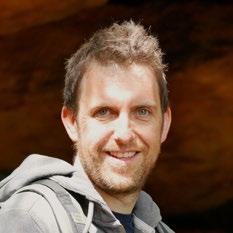
contemporary society and to assess how diverse values and priorities are expressed or oppressed through patterns of exclusion and inclusion. Climate change and biodiversity loss occur on a range of scales, from the global to the back garden. Understanding the links between international, national and local scales and connecting this to their personal experiences is essential to enabling students to find their own way to fit in with efforts to tackle sustainability challenges. In the second lecture, Chris Skidmore will discuss these issues with Dr Debbie Hopkins.
Finally, Sam Barratt and Ann Finlayson will turn to hope and humility. Against the backdrop of chronic under-achievements in addressing climate change and biodiversity loss is growing interest in the role of hope and humility in sustainability education. Hope is different to optimism. Optimism is usually associated with the feeling that a desired outcome is likely to occur. Hope, however, involves being open about the scale of the challenges and difficulties involved. As Desmond Tutu
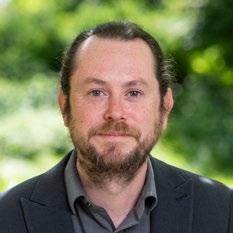
reportedly put it: ‘Hope is being able to see that there is light despite all the darkness.’ Hope has a rich history in educational theorising and social life not only because it motivates action in the face of unfavourable odds, which is essential in responding to climate change, but also because it provides the conceptual tools to engage with, and address, fear and despair. These issues, and what they mean for the higher education sector, Oxford University and Green Templeton College, will be explored in a series of dialogues held at Green Templeton in Hilary Term 2025. We hope some of you will be able to join us for what we expect will be a stimulating and provocative series.
Dr Mark Hirons is a Senior Researcher based at the Environmental Change Institute and Dr James Robson is Associate Professor of Tertiary Education Systems and Director of the Centre for Skills, Knowledge and Organisational Performance, University of Oxford. Both Mark and James are Research Fellows at college.
The history of modern astronomy is one of increased partnership between humans and machines. From Galileo mapping the moons of Mars with a refracting telescope in the 17th century, to the late-20th-century invention of digital detectors and electronic computers which can detect the explosions of stars millions of light-years away, successive improvements in technology have allowed astronomers to capture more data, better data, and faster than ever.
Over the last decade, our relationship with our machines has once again been transformed. Whether you call it statistical learning, machine learning or artificial intelligence, new methods and increasingly user-friendly software have allowed our computers to be trained on our wealth of data and learn to recognise complex patterns. In addition to helping us gather, store and process data, our machines can now help us interpret them. In sky surveys like ATLAS (Asteroid Terrestrialimpact Last Alert System), which

look for near-earth asteroids and new cosmic explosions, each night brings a new game of ‘spot the difference’. But instead of looking at 10 differences, humans are bombarded with 10 million. Most of these are artefacts (bogus detections), much of the rest are known variable stars, and a few (roughly 100 a week) are the shiny deaths of distant stars.
Finding these needles in the cosmic haystack requires a mixture of very simple techniques (discarding noisy images) and very complex ones (computer vision) trained on large samples of past data to distinguish the good from the bad. At each step of automation, a key ingredient to maintain peace between astronomers and their machines is trust. Researchers need to know that the tools they use are reliable, stable and that their behaviour is understood (if not by them, by peers who developed and tested the methods). Reproducibility is an inherent aspect of scientific endeavour, and we cannot allow this trust between scientists and their machines to erode.
If the 2010s gave us the Deep Learning Revolution and computer vision, the 2020s are the decade of Large Language Models, with computers that not only recognise your face in family photos but also talk to you as if they were breathing, thinking human beings. For astronomy and science in general, these new machines are different from previous leaps in technology. Not just for their potential, but for their danger. The scale of computing power required to thoroughly test generative AI models means that this is inaccessible to most academic teams. What does that mean for our trust in our machines?
A 2024 report by the Royal Society (‘Science in the Age of AI’) summarises the opportunities and challenges ahead.
In 2025, the Vera Rubin Observatory in Chile will begin operations. It will allow us to probe the nature of dark matter, catalogue asteroids and comets, map our own galaxy like never before, and increase our discovery rate of cosmic explosions by a factor of 100 to 1,000. As a computational astronomer
developing virtual assistants for sky surveys, I am acutely aware that fostering our relationship with our machines has never been more important. We need to be passionate about the potential that new machine learning tools bring, yet also profoundly sceptical of their applicability for science. We must preserve reproducibility above all, as the data we gather and process now will affect generations of astronomers to come. We must pick our tools because they are right for the job, because they can be thoroughly tested. Finally, we must strengthen our relationships to other humans: the statisticians, the computer scientists.
The future of astronomy is bright, and it will require more than a connection to our machines.
Dr Heloise Stevance is one of the first Eric and Wendy Schmidt AI in Science Fellows in the Sub-Department of Astrophysics, University of Oxford. Heloise joined as one of seven new Research Associates focused on astrophysics at college.
Throughout its history the college has been home to students working towards a sustainable future. For this year’s Observatory, we asked eight alumni from a range of courses about their time in Oxford and their career journeys.



(DPhil Geography & the Environment, 1998)
I arrived at Oxford already trained as a zoologist, aiming to transition into the field of sustainability by undertaking a DPhil in economic geography. The Oxford experience was an intellectual baptism by fire, with exposure to exceptional academic minds across a mind-boggling range of fields. Top thinkers from science, the arts and politics were giving lectures accessible to all virtually every evening, while Green College provided a fantastic lecture series focused on the medical sciences right on my doorstep. It was a veritable sweetie jar of mental stimulation!
Green Templeton is a green oasis in north Oxford providing a peaceful setting for intellectual pursuit. The beauty is matched by the brilliance and energy of the student body and the kind commitment of college staff. Oxford exposed me to mentally agile individuals, able to dive into deeply technical material one minute and zoom out to the grand narrative the next, neatly exposing what the detail means for the big picture. I always envied that ability and hope that a tiny bit of the stardust brushed off on me.
In my role as Head of the Group on Enabling Systems Change at the European Environment Agency in Copenhagen, I manage a team assessing Europe’s progress towards sustainability. Our job as an agency is to provide evidence on the state of the European environment and climate as a basis for policy-making by the European Commission.
Part of my job that I particularly enjoy is translating evidence from the scientific community into materials that can be digested and used by policymakers – a bridge between science and policy. I was instrumental in carving out a role for the European Environment Agency in cross-European initiatives to monitor human exposure to chemicals and support chemical risk assessment, funded by the EU’s Horizon 2020 programme.
(DPhil Zoology, 2000)
I joined then-Green College from Kenya and did not know very much about the college system at Oxford, but luckily my supervisor was an alumnus. He spoke very highly of the college and mentioned that many of the students there were pursuing degrees in various fields of medicine. I felt that I would feel at home with medical colleagues so I visited the college website and loved the photos of the Observatory!
I was looking for a small college as I was keen to make new friends and thought it would be easier if there were fewer fellow students to get to know. I received such a kind and warm welcome from everyone when I arrived, including the porter’s office, and knew immediately that Green College was the right choice.
My background is in global health, science and climate research, with a special focus on Africa.
I am proud to have been part of the team that set up the Science for Africa Foundation, a pan-African, non-profit, public charitable organisation created to support, strengthen and promote science and innovation in Africa. As a trusted partner of African scientists and innovators, we enable Africa’s science and innovation to achieve maximum impact.
As Head of Programmes, I am responsible for leading initiatives related to endemic, emerging and re-emerging diseases, as well as planetary health. My role involves applying strategic leadership to support African scientists in co-creating solutions for a healthier, sustainable future. During the pandemic, I was invited to co-chair the World Meteorological Organization’s (WMO) COVID-19 Task Team, giving advice and updates on how meteorological and air quality factors might influence the transmission of the virus. I am also a member of the WMO Research Board, where I contribute an African lens to advice in critical weather, climate and environmental research.
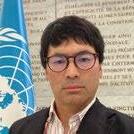
(MSc Nature, Society & Environmental Policy, 2004)
I am currently Senior Strategy and Planning Officer at FAO (Food and Agriculture Organization of the United Nations) headquarters in Rome. I’m particularly focused on making FAO more innovative and helping the organisation address systemic issues rather than chase smaller, ad hoc projects. One of my most exciting projects is reviewing the FAO Strategic Framework incorporating foresight methodology. My career spans environmental technology, international development and diplomatic service, embodying a blend of technical expertise and international cooperation.
After graduating with a degree in mechanical engineering from Waseda University in Japan, I began my career at Isuzu’s Advanced Engineering Centre. There, I developed new hybrid vehicle technology and obtained multiple patents, helping Isuzu commercialise one of the world’s earliest hybrid vehicles. Although I found the technical challenges fascinating, I increasingly felt drawn to making a broader impact in environmental conservation on an international scale.
My time in Oxford offered exactly what I was looking for – a deep dive into environmental policy that considered both natural and social dimensions. Some of my fondest memories come from being part of the Boat Club and spending evenings at the college bar. After Oxford, I joined Nomura Research Institute Europe in London, where I focused on environmental finance and risk management. I developed business models including environmental finance, carbon assets and corporate social responsibility analytics, working with hedge funds, banks and banking regulators.
I then spent nine years in various roles with the UN Development Programme in Indonesia, including being Programme Manager for Climate Change and Asia Manager of the Green Commodities Programme. One of my proudest achievements was establishing the Indonesia Climate Change Trust Fund, the country’s first nationally owned and managed multi-donor trust fund. I later served as First Secretary at the Permanent Mission of Japan to the UN in New York.
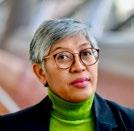
(MSc Environmental Change & Management, 2010)
I have devoted more than 30 years to environmental health, actively advocating on chemicals and waste issues.
My journey began as an environmental consultant before I moved to the NGO sector in 1996. In 2020, I co-founded BaliFokus Foundation, which was later transformed and rebranded as the Nexus Foundation for Environmental, Health and Development.
My work has focused on mitigating the challenges of pollution, climate change and biodiversity loss.
My time at Green Templeton was a memorable one. The college is an excellent home for environmentalists, health experts and sustainable business scholars. I appreciated the conversation and the guidance of the late Professor Jeff Burley and Professor Gerry Bodeker to advance Project Southeast Asia at Oxford, an initiative to promote Southeast Asian multidisciplinary studies at Oxford.
In 2024, I was elected as one of the co-chairs of the International Pollutants Elimination Network (IPEN), a global network of over 600 public interest NGOs in 130 countries working together for a toxicsfree future.
I am an Ashoka Fellow and a LEAD Fellow, a testament to my leadership on sustainable development. My bachelor's degree was in environmental engineering from the Bandung Institute of Technology, Indonesia. My work and policy recommendations have contributed to changing narratives and policy on chemicals and waste.


(MSc Water Science, Policy & Management, 2012)
I am a Senior Water Specialist at the World Bank, West Africa region. My work focuses on the Sahel region, at the intersection of water resources management, innovative circular solutions for water service provision, and livelihoods development in a context of fragility and insecurity.
I joined Oxford and Green Templeton hoping to diversify my recently acquired skills as an environmental engineer, freshly graduated from Stanford University, and to take a deeper dive into the topic of water management. I loved the fact that the college focused on graduate students, allowing me to learn so much from my peers at casual run-ins over lunch, studying in the Observatory or library, or at the Stables Bar. Some of my fondest memories involve collecting apples in an orchard and making apple cider from scratch with some other students, and foraging for nettles to make (and eat) pesto while we worked on the apples.

Though my thesis at Oxford was entirely focused on Southern California water issues, my professors, peers and fellow GTC students encouraged me to look beyond this geographic area, and I wound up applying for a job to work on water issues in Latin America with the World Bank in 2013. This position launched my career in international development.
I have since had the opportunity to work across many geographies with the World Bank, such as water supply and sanitation services to rural indigenous communities in Latin America, promoting wastewater reuse for irrigation in Tunisia, and supporting improved water resources management planning and circular economy in Senegal. The multidisciplinary nature of the work I carried out at Oxford equipped me to contribute strategically to our portfolio in this complex context, and to support my counterparts with project management and technical expertise.

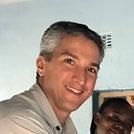
(MSc Environmental Change & Management, 1998)
I grew up in Kenya and developed a passion for landscapes where people and wildlife lived together. From the age of 16, I volunteered during my holidays on rhino sanctuaries and with the Kenya Wildlife Service Rhino Unit. This cemented my aim to become a conservationist. At the time I came to Oxford, Green College was one of only three colleges welcoming students in the environmental space.
Two people in particular had a great impact on me at college. Head Gardener Michael Pirie taught me throughout the year about how he nurtured the wild and the tame into a stunning botanical microecosystem.
My master’s thesis supervisor and global expert in traditional medicine, Professor Gerry Bodeker, enabled me to visit South Africa to learn how wild aloes were commercially used and conserved, and to explore whether the same techniques could be used to protect and sustainably manage threatened aloes in Kenya. This taught me that people conserve what they value.
I spent the next half of my career in the conservation non-profit sector. Subsequently, I went on to found a forest carbon social enterprise called BCP (BioCarbon Partners). I served as CEO for ten years, and BCP went on to become Africa’s largest and most impactful forest carbon project developer, built by an African team in a sector dominated by European and US firms.
In 2022, I founded Sayari Earth to focus on new carbon methodologies and oceans beyond Africa. The scale of the planetary crisis is so large that our goals need to be ambitious. By 2034, we aim to impact 45 million hectares and 10 million people. Our mission is to help restore our planet by empowering people. We are doing this through large-scale, nature-based carbon removal projects fuelled by technology and innovation.

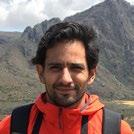
(MPhil Development Studies, 2012)
I am currently Associate Professor at the Institute for Economics Research at Universidad Nacional Autónoma de México and UNESCO Chair in Socioeconomic Evaluation of Biodiversity and Ecosystems. My main focus is evaluating and improving instruments designed to protect forests, particularly those that provide financial incentives to landholders in exchange for not converting forests to other uses.
Since my time as a student at Green Templeton, I have been documenting on-the-ground impacts of conservation payments in tropical forests and have aimed to provide tangible recommendations that help policy-makers to improve their design and implementation. I still hold the fondest memories from my time in college – including living in various residences and playing on the basketball team, and winning the 2013 Cuppers Championship. I spent countless hours studying in the library, enjoying lunch at the Radcliffe Observatory, participating in potlucks, and even working at the Stables Bar. My time was filled with many unforgettable experiences. To this day, I remain close friends with wonderful people I met during my time at college. The staff too left a lasting impression – especially the late Accommodation Manager Nick Martin, who was always so kind, approachable and helpful.
Working in sustainability, and particularly on issues related to forest protection, demands a constant balancing act between hope and frustration. After more than a decade researching and working as a practitioner in tropical forest regions in Mexico and other Latin American countries, I have witnessed first-hand the harsh and concerning reality of deforestation and forest degradation. Yet I feel incredibly privileged to have been involved with agrarian and indigenous community members in Chiapas in Mexico and the Colombian Amazon, scholars and students worldwide, as well as dedicated professionals from NGOs, governments and other organisations.

(MBA, 2009; MSc Environmental Change & Management, 2010; DPhil Geography & the Environment, 2011)
I’m based at the Saïd Business School, and my work focuses on addressing one of the most pressing challenges of our time: climate crisis. I am dedicated to exploring how businesses can not only take ownership of but also actively drive solutions to the climate crisis.
I vividly recall my first steps into college on an autumn day in 2009. Fresh off a long flight from Lahore, Pakistan, weary-eyed and accompanied by a young family, I found myself stepping into an extraordinary world of learning and community. What began as a oneyear master’s programme turned into a lifelong journey of personal and intellectual growth at Oxford. Our early years were spent on Observatory Street, where the backyard opened into the lush college gardens – a source of endless joy for my children. They still treasure memories of chasing each other through the garden sprinklers and revelling in the magic of those moments.
We connected with other families, celebrated countless birthdays and shared cherished moments. Beyond the personal, college shaped my professional aspirations. Having grown up in Pakistan, a country acutely vulnerable to climate change, the devastating floods of 2010 motivated me to deepen my understanding of this pressing global challenge. I pursued a DPhil in climate and sustainability at the Environmental Change Institute while remaining a student at college.
The journey was transformative, both academically and personally. Under the guidance of dedicated mentors, I explored climate vulnerability in remote villages in Kenya, Nepal, Ghana and Senegal, working with smallholder farmers, building their resilience. Although these field trips meant spending long periods away from my family, I knew they were supported by the vibrant college community. Green Templeton also provided avenues to embrace Oxford traditions.
I fulfilled a long-held dream of learning to row, represented Oxford in snooker matches and cherished every opportunity to engage in the rich cultural and academic life.


The Green Templeton Lectures 2024 explored the emerging area of thought that maintaining the Earth’s ecosystems and natural resources in a balanced and sustainable state is essential not only to long-term human health but also to social equity and prosperity.
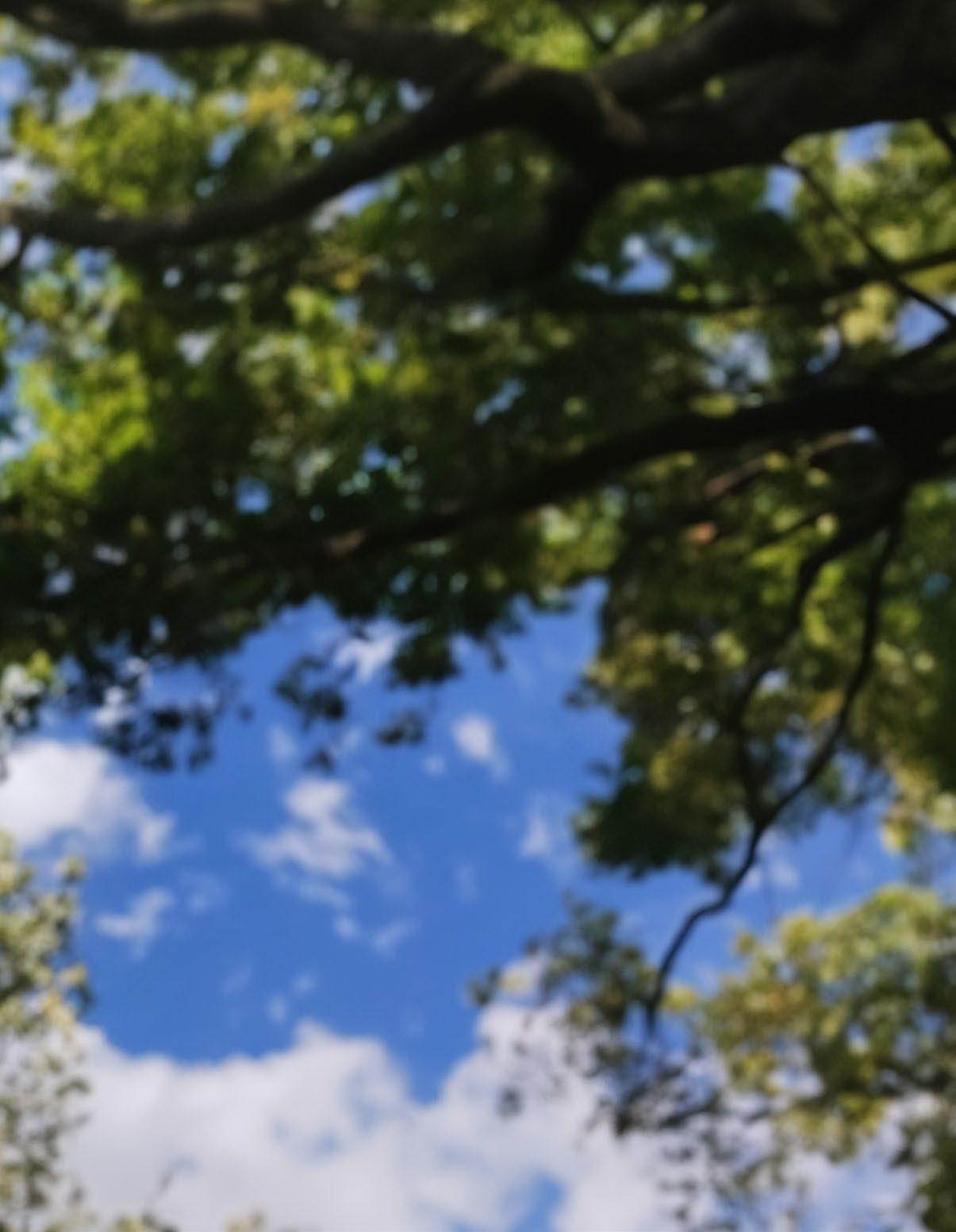
Planetary health integrates environmental science with public health, advocating for a holistic approach to address challenges like climate change, pollution and resource depletion in ways that protect both the planet and people. It highlights the need for global cooperation and systemic changes to create a more sustainable and resilient future for the environment and humanity.
The series, convened by Research Fellow Dr SanYuMay Tun together with Governing Body Fellow Dr Marc Thompson and Research Fellow Dr Laurence Wainwright, considered intersections with the stability of financial systems, economics beyond growth and the legal process.
The first lecture in the series featured Jo Paisley, president of GARP Risk Institute, and Richard Barker, Professor of Accounting at the Saïd Business School, who explored the relationship between planetary health, financial stability and corporate sustainability.
Paisley focused on the impacts of climate change on the financial system and how finance contributes to climate change. She highlighted two main risks: physical risks (like extreme weather events) and transition risks (due to the shift to a lowcarbon economy). She explained that these risks are already being felt and will worsen if emissions remain unchecked. Current financial models do not fully capture these risks, and economic losses could be much higher than expected. Paisley stressed the need for policy intervention to guide financial systems towards supporting green technologies.
Barker discussed the role of corporate sustainability reporting in addressing climate risks. He emphasised that sustainability, as defined by the United Nations Brundtland Commission, involves managing natural capital and ensuring that corporate activities do not deplete it. Barker pointed out that corporate transparency through sustainability disclosures is critical for investors to understand climate-related risks and opportunities. However, he argued that while such reporting is necessary, it is insufficient without accompanying policy changes.
Both speakers concluded that addressing climate risks requires coordinated efforts between policymakers, financial institutions and corporations. Transparency and education are important, but policy change is crucial to drive meaningful action for both financial stability and planetary health.
The second lecture featured Catherine Howarth, ShareAction CEO, and Kate Raworth, creator of doughnut economics, who discussed the role of finance and economic systems in promoting planetary health.
Howarth focused on how institutional investors can drive corporate change, arguing that the growth-oriented economy has worsened environmental and public health issues, such as air pollution, biodiversity loss and inequality. She shared her experiences in shareholder activism, advocating for expanding fiduciary duty to include health and well-being considerations and promoting participatory governance in pension funds for responsible investment.
Raworth introduced her doughnut economics model, which aims to balance human development with ecological sustainability. She questioned the growth paradigm, particularly in high-income countries, which exceeds planetary boundaries while failing to meet basic human needs. Raworth called for a shift to regenerative business models that prioritise sustainability and the redesign of company structures to align with ecological and social goals.
Both speakers emphasised the need for a rethink of economic systems, where financial institutions play a crucial role in promoting sustainability. They also highlighted the need for policy support to facilitate business model transformations. Their discussion raised questions about measuring sustainability, the role of AI, and the future of economics education in addressing planetary limits. Their central message was that finance must evolve into an active force for shaping a sustainable future.
The third and final lecture featured Jojo Mehta, Stop Ecocide co-founder and executive director, and Thom Wetzer, founding director of the Oxford Sustainable Law Programme, discussing legal frameworks for planetary health.
Mehta focused on ecocide law, advocating for the criminalisation of large-scale environmental destruction. She highlighted the role of compartmentalisation in societal structures that fuels environmental exploitation, stressing that law is essential in protecting ecosystems. Mehta’s organisation, Stop Ecocide International, has developed a clear definition of ecocide and is pushing for its recognition as a serious crime in international law. She emphasised the need for legal systems to hold individuals and corporations accountable for environmental harm.
Wetzer discussed legal innovation as a tool to restore balance between human welfare and environmental health. He highlighted the importance of attribution science and intertemporal governance, which links human actions to climate change and addresses long-term planetary issues. Wetzer argued for legal frameworks that support sustainability within existing systems rather than a complete overhaul, and mentioned successful climate litigation cases as examples of legal actions driving change.
Both speakers stressed the need for legal reforms and innovations to protect the planet and reconcile human activities with environmental conservation.
The series stimulated substantial discussions on the sidelines of the lectures, both at the college dinners that followed and between participants outside college.

SanYuMay Tun said: ‘I was delighted to be able to work with a range of colleagues from across Oxford and beyond through these three lectures. It was a fabulous example of how Green Templeton can catalyse knowledge exchange through bringing together individuals from a wide range of backgrounds and disciplines for policy-oriented dialogue.’
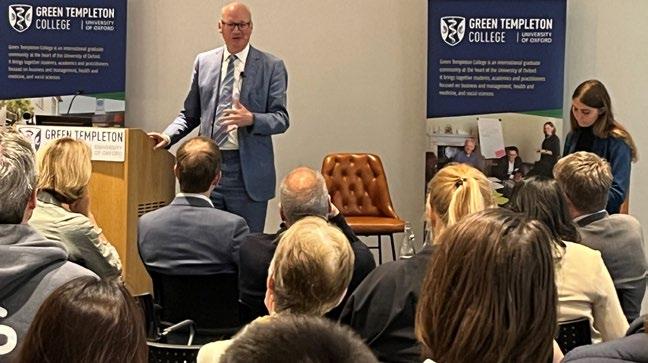
Principal’s Circle fellows supported a discussion and dinner with James Cameron, an authority in the global climate change movement, moderated by Emily Buckley (MSc Sustainability, Enterprise and Environment, 2023) in June
Former visiting student
Professor Derek O’Keeffe discussed digital health solutions and AI in medicine with alumni at an online event in November
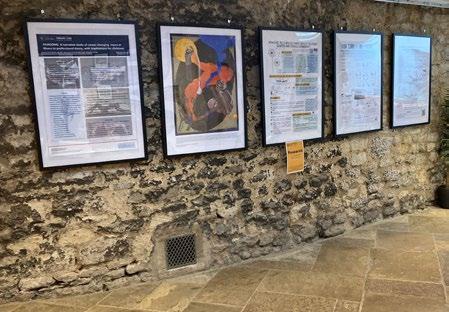
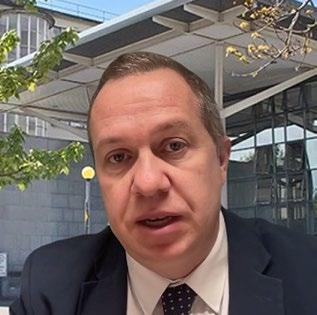
‘Pelvis Presley’, the college’s resident medical skeleton, was featured to celebrate World Book Day in March
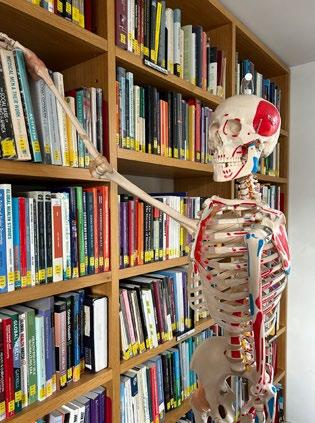
Student research posters on display in the Stables Gallery in December
Annual Fund donors enabled nine Green Templeton students to attend an intensive introductory course on British Sign Language, focusing on communication in medical and healthcare settings, organised by Sasha Webb (Clinical Medicine, 2021) in May

Guests at the 16th Human Welfare Conference, ‘FemTech Forward 2024: Transforming Women’s Health with Tech’, in May
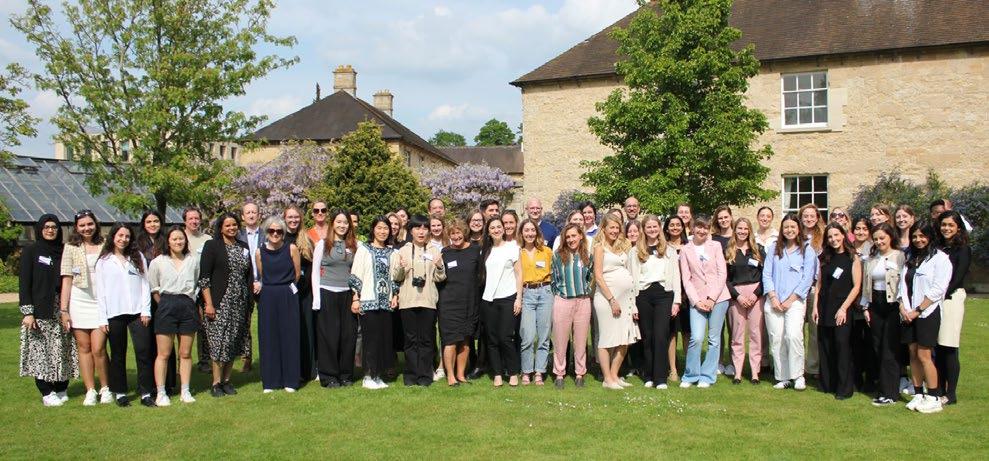
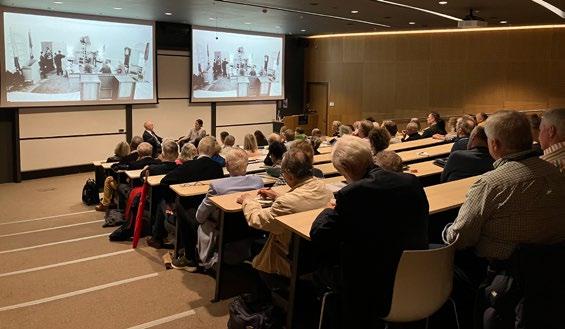
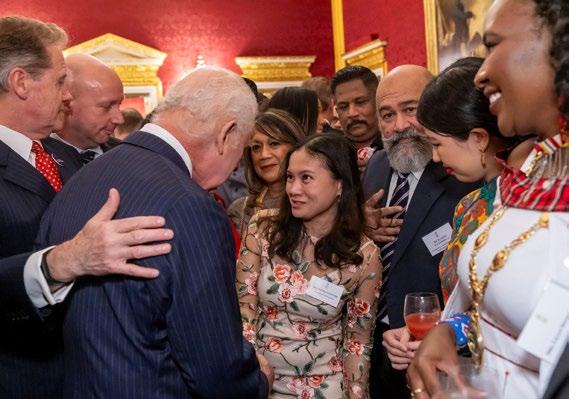
Chris Liddell, Visiting Research Fellow and former White House Deputy Chief of Staff, in conversation with Mitali Mukherjee, Associate Fellow and Director of Journalist Programmes, Reuters Institute for the Study of Journalism, at the university’s Meeting Minds alumni weekend in September
Niklas Wenzler (MSc Modelling for Global Health, 2021) met Dr Milap Rughani (MSc(Res) Oncology, 2011) in Brisbane, Australia, in October, to find out about his work as a consultant plastic surgeon, inspired by his alumni profile on the college website

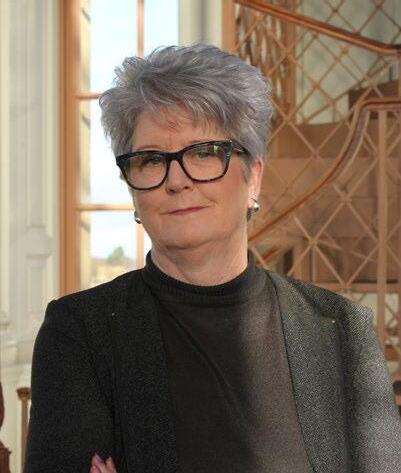
This year is set to mark a significant shift in our fundraising ambitions.
In 2024, Green Templeton secured five years of support from a universitywide fund to help deliver its strategic objectives. This relies on us significantly increasing our fundraising to finance big projects such as the Woodstock Road site masterplan and the conservation of the Radcliffe Observatory, as well as increasing the amount of funds we can commit to student support. We will also expand the development team, because to raise money you have to spend money: on staff, on events to support donors, and on communications.
But the development team can only generate support with the whole community behind us and so I am pleased that the Development Committee is being reinstated. It will be chaired by long-standing Principal’s Circle member Michael Cook, who has been elected to Governing Body as a Barclay Fellow. Committee members will be drawn from experienced external contacts and friends of the college as well as the fellowship.
Michael’s appointment marks our intention to work with seasoned professionals who have direct experience of raising transformational support. The college will also have a new Head of Development and a new Head of Supporter and Alumni Engagement working alongside Head of Development Operations Andrew Sanders.
In May 2024, the Principal and I travelled to Asia to meet alumni and potential supporters of the college. We were warmly welcomed in Hong Kong, Singapore and Tokyo and as a result we now have emerging alumni groups in each city. I am grateful to those alumni who have volunteered to help progress the groups.
We have also an established and active group in Kuala Lumpur, and have made real progress in establishing groups in Australia and closer to home in Oxfordshire. I am delighted to say that the London group is going from strength to strength, with recent events being hosted in collaboration with St Antony’s College London alumni group, and plans for a similar event with Nuffield College’s London alumni group.
Fellows of the college have travelled to meet alumni in Berlin and Cairo. It feels as though 2024 truly was a year for the global Green Templeton alumni community to come together locally, and I look forward to more groups being established in 2025 and beyond.
In September we hosted the annual Oxford Meeting Minds alumni weekend, with a particular focus on celebrating 40 years since the founding of Templeton College. We welcomed over 100 Templeton alumni and fellows to college for a gala dinner, where the Principal spoke of the place that Templeton College holds in the history and focus of the college and the lasting connections with the Templeton family foundations.
2025 feels like a year for significant and positive change. I would encourage all members of our community, our friends and partners to consider how their individual contribution can help the college realise its ambitions. I am always happy to talk to anyone who wants to be part of an exciting time in Green Templeton’s history. Please do get in touch: ceri.butcher@gtc.ox.ac.uk

Ceri Butcher Director of Development January 2025
Green Templeton has embarked on a significant project to conserve and decarbonise the Radcliffe Observatory – to carry out much-needed work, increase the environmental efficiency of the building, and improve accessibility and use.
During 2024 the college raised the sums necessary to take the project through to the next stage of the Royal Institute of British Architects’ (RIBA) Plan of Work: Stage 4 – Technical Design. This is the exciting stage in which ideas turn into precise plans and construction-ready documents, and the project moves from concept to constructible design.
We have engaged specialist heritage architects Purcell, and discussions with the local conservation officers and Historic England were held in November. An Expression of Interest to the National Lottery Heritage Fund (NLHF) elicited a positive response at the first attempt, and the college is actively engaging partners and friends and developing a public engagement plan. The project is also being generously supported by private donations.
With support from the NLHF and other similar funders, three strands of activities are being developed: celebrating the landmark, cosmic collaborations, and innovation through conservation.
A team of staff and external experts is working to ensure that the Radcliffe Observatory has the longevity it deserves, both in the hearts and minds of the college, and as a historic building of international importance in the city of Oxford.
For more information about the project and how you can support it, visit: gtc.ox.ac.uk/observatory or contact development@gtc.ox.ac.uk
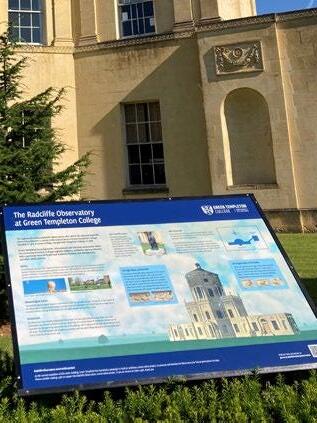

“Urgent conservation of the uniquely significant Radcliffe Observatory is essential to ensure it remains a proud beacon across Oxford for generations to come. Originally built as a hub of scientific and technological innovation, and now a centrepiece of the university’s Radcliffe Observatory Quarter, Purcell’s expert team of architects and heritage consultants are pioneering solutions in reducing the carbon emissions in this Grade I listed building and enhancing access to it for the wider community.”
Agata Olszewska, Architect and Project Lead, Purcell

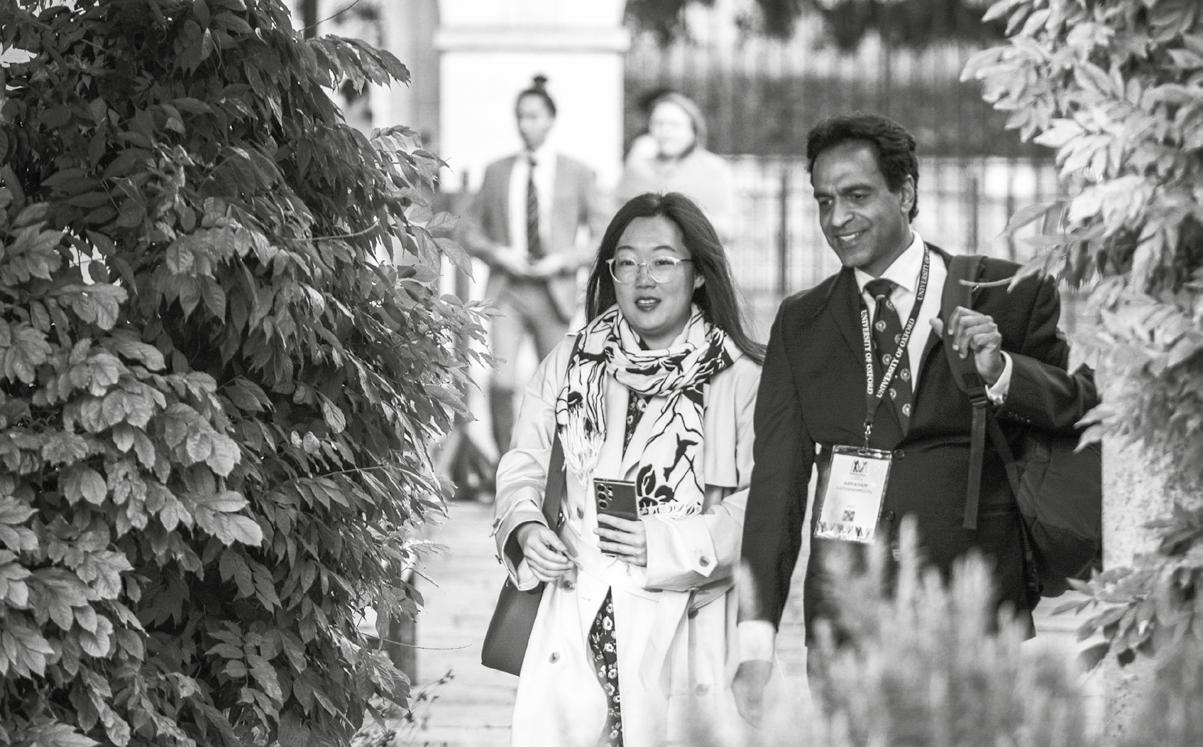
Expanding the network of individuals invested in the future success of Green Templeton remains of the highest priority. As you can see elsewhere in this issue, this is an effort with substantial levels of engagement underway in Oxford, across the UK and the world.
Green Templeton has a strong story to tell, an iconic Oxford building on our campus, and enthusiasm and commitment from its existing broad community.
The college refined its priorities during 2024 to engage more effectively with prospective partners and donors over the coming years. An important step was the production of a draft document to test the effectiveness of the proposition. This received substantial positive feedback and suggestions through the summer that have been acted on.
A full case for giving to the college is currently being developed to be used in a major fundraising campaign set to begin this year.
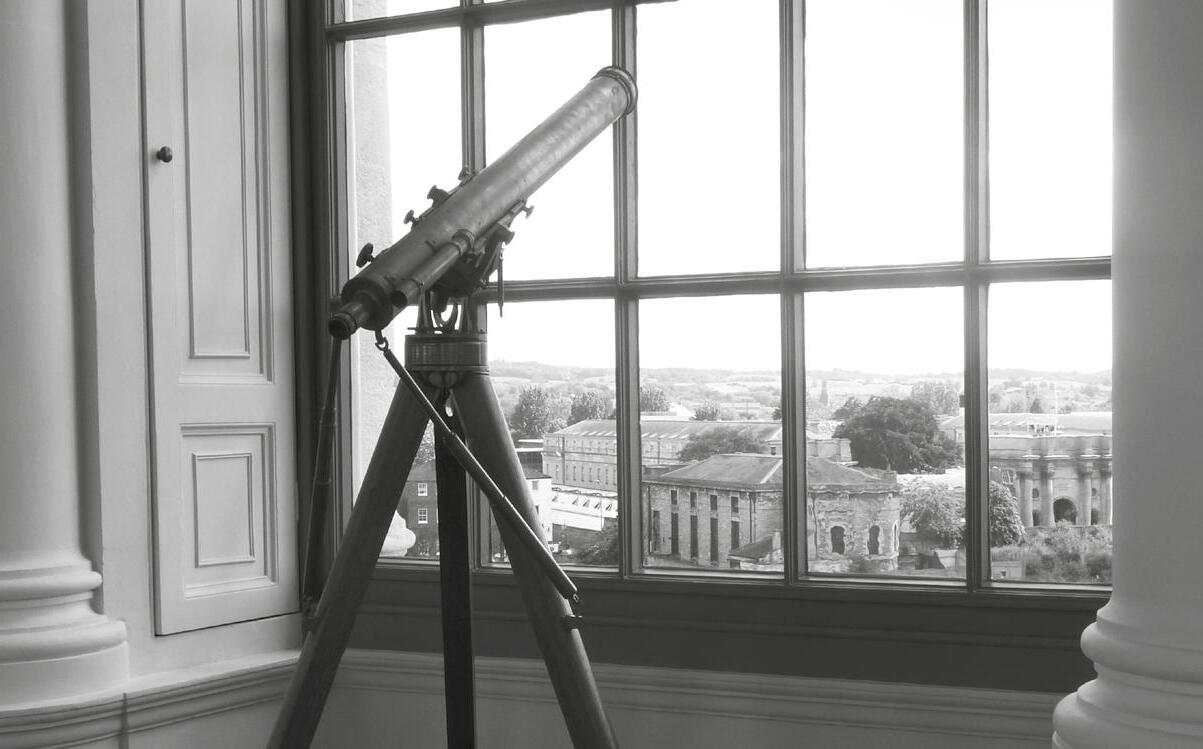
• Tackling the full cost of being a student. This includes learning and travel grants, financial assistance schemes, affordable college accommodation and a vibrant, supportive student experience.
• Growing our portfolio of scholarships to support real costs and expand the diversity of graduate learners. This includes studentships that address under-representation, that provide support for visa and childcare costs, and for ‘writing up’ stages of study.
• Unlocking opportunities to enhance learning and personal and professional development. This includes academic enhancement activities plus social and cultural enrichment.
• Establishing a series of centres of academic excellence engaging with policy and practice on themes related to human welfare.
• The first proposed centre, the Centre for Global Philanthropy, will focus on the production and use of trusted, high-quality evidence to increase the volume and impact of philanthropy globally.
For more information on our exciting fundraising plans and how you can get involved, visit: gtc.ox.ac.uk/giving or contact development@gtc.ox.ac.uk
• Creating a student village of purpose-built, energy-efficient accommodation within the former walled garden of Observer’s House.
• Establishing a multipurpose hub at the heart of the Woodstock Road site with improved teaching and lecture space, meeting rooms, and hospitality and social spaces.
• Ensuring the Radcliffe Observatory is fit for purpose for a second 250 years through a conservation and decarbonisation project to preserve and maintain it as an integral part of the college’s operations.
• The collegiate model at the University of Oxford is predicated on subsidising its world-leading education, learning and personal development for students through other sources of income. These range from commercial activities in support of core charitable purposes, successful fundraising and income from an endowment and longterm investments.
• Green Templeton has made significant strides towards operating with small annual surpluses in recent years, but maximising the future of the college’s potential over the long term will ultimately require larger levels of investment.
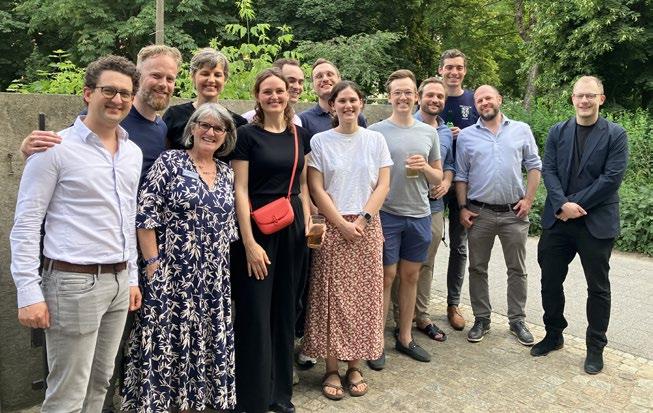
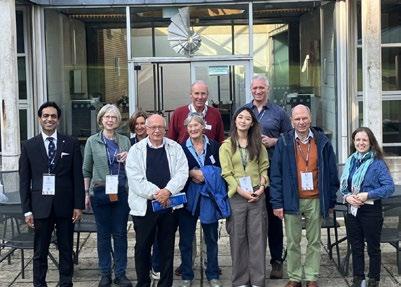
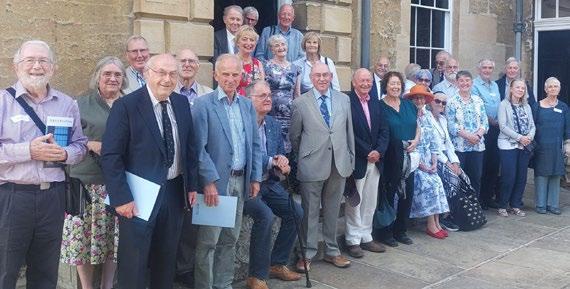
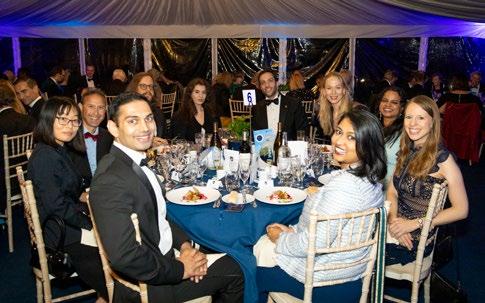
Current supporters met with students benefiting from funding through college at a reception in the Tower Room in November
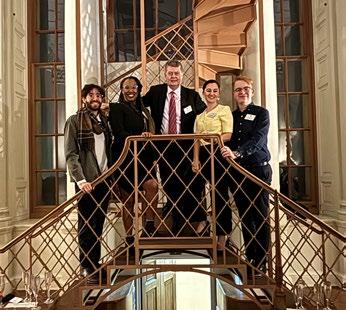
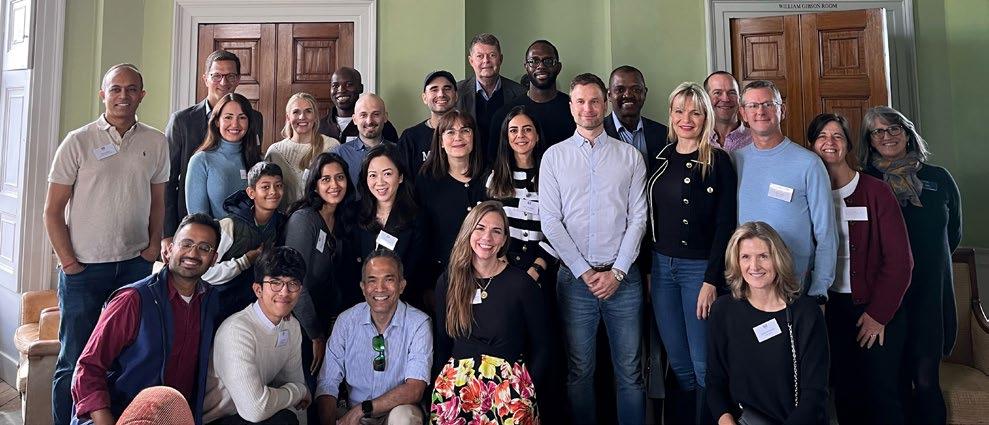

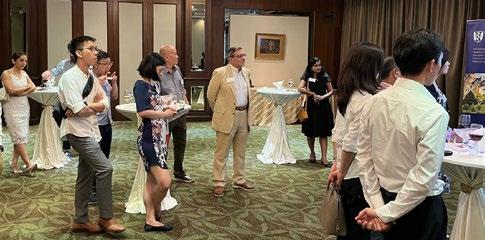

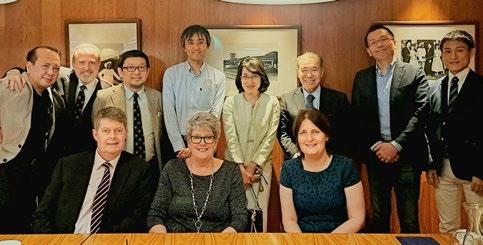
Green Templeton secured planning permission in 2024 for a series of projects incorporating the Radcliffe Observatory at its main site on Woodstock Road.
• Three purpose-built accommodation buildings will house much-needed study-bedrooms.
• A multi-purpose hub with social, meeting and conference spaces will include a dining hall fit for a community of over 1,000 people.
• A new single-storey building will include a café and an informal study space.
• A permanent sports facility.
The new buildings, which will be built to energy efficiency and thermal performance standards, will reduce site-wide carbon emissions by over 40%.
If you would like further information about these capital projects, or would like to support them, please contact domestic.bursar@gtc.ox.ac.uk
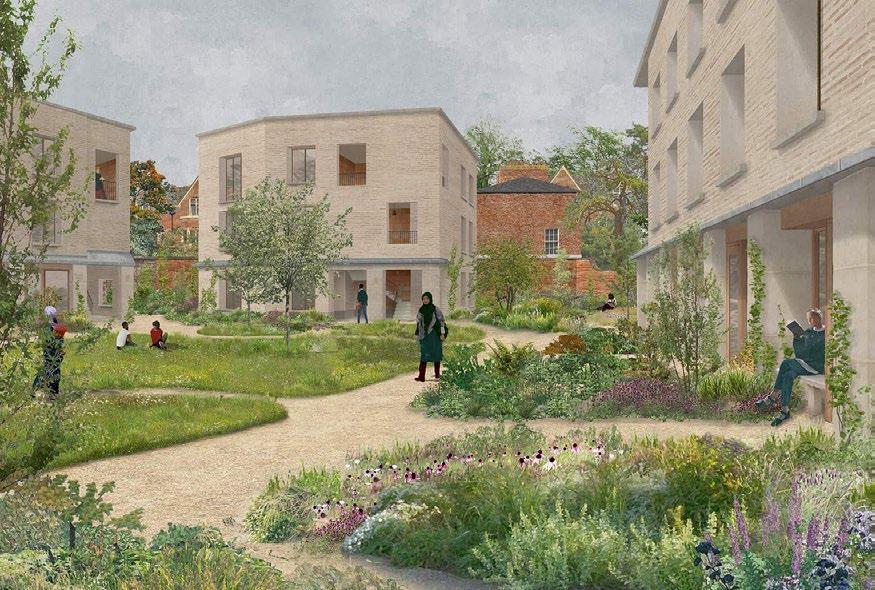
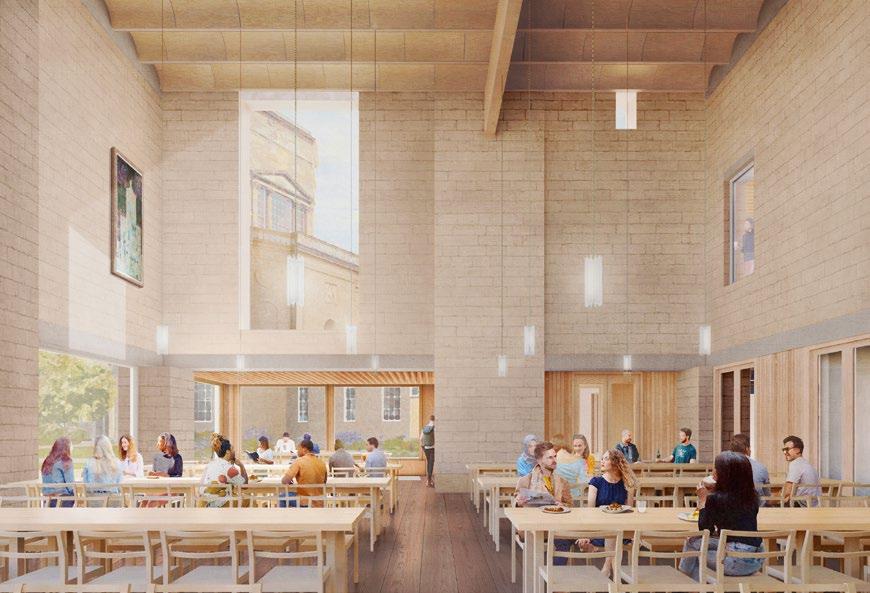
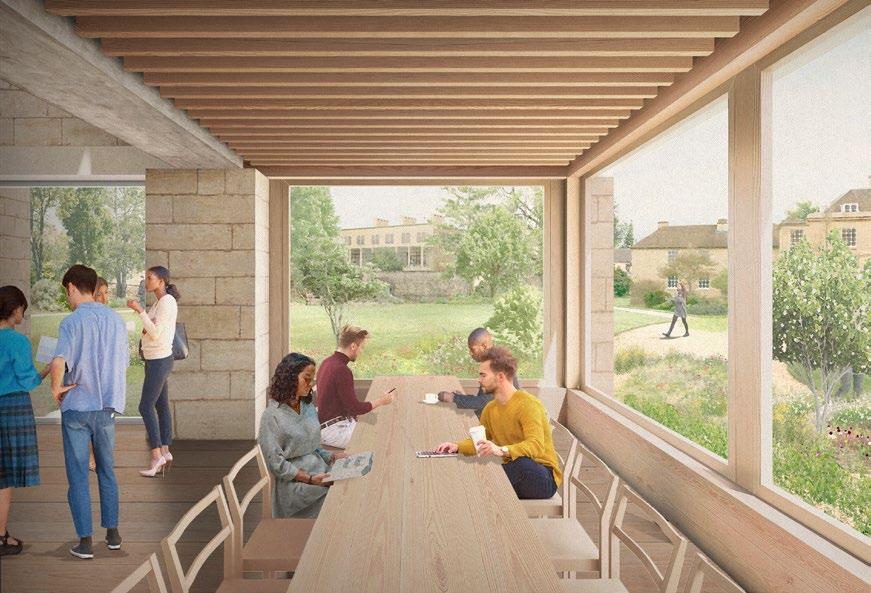
Left: Open outlook from the ground floor of the multipurpose hub to the Green Templeton gardens north of the Radcliffe Observatory
Below: The first-floor social, meeting and conference space looks south to the new Stephen A. Schwarzman Centre for the Humanities
Previous page
Top: New accommodation in the former walled garden of Observer’s House
Bottom: A fit-for-purpose dining hall in a new building with a picture window to the Radcliffe Observatory
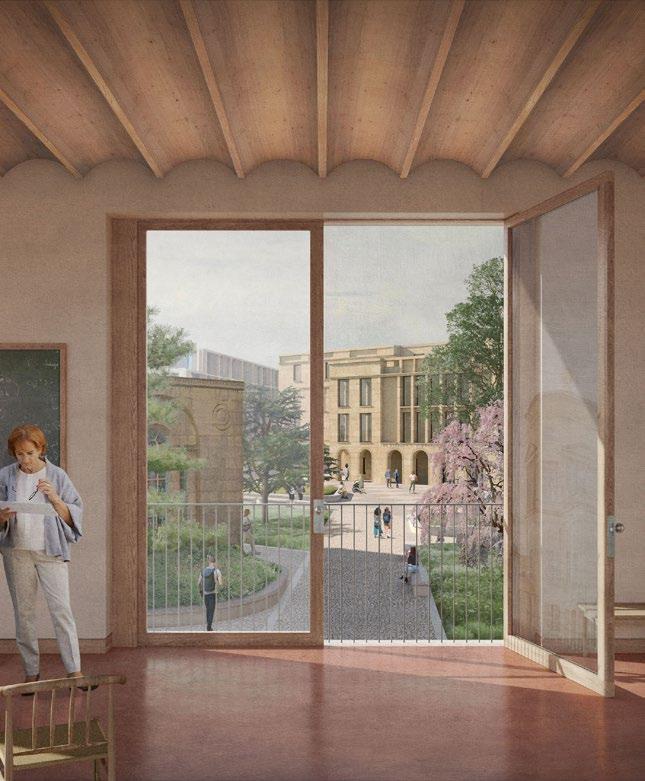
Michael Cook has been elected a Barclay Fellow and Governing Body Fellow. Michael was previously an Associate Fellow and member of the Principal’s Circle. Michael is the founder and chairman of SouthernSun Asset Management.
Professor Sir Jonathan Montgomery has been elected a Barclay Fellow and Governing Body Fellow. He is Professor of Health Care Law at University College London, and Chair of Oxford University Hospitals.
Dr Seiji Kawasaki, chairman of the board of directors of Kawasaki Gakuen medical institute, was made a Radcliffe Fellow.
Dr Federica De Stefano has joined as a Research Fellow. She is Associate Professor of Organisation Studies at the Saïd Business School, University of Oxford.
Dr Agnieszka Kubal is a Research Fellow. She is Associate Professor at the Centre for Socio-Legal Studies, Law Faculty, University of Oxford.
Dr David Metcalfe has become a Research Fellow. He is the inaugural Kadoorie Associate Professor of Emergency Medicine, University of Oxford.
Dr Robert Prey has become a Research Fellow. He is Associate Professor of Digital Culture at the Oxford Internet Institute, University of Oxford.
Dr Alexandra Noble has joined as a Girdlers’ Health Research Council of New Zealand Fellow.
Dr Nick Broughton has become an Associate Fellow. He is the interim Chief Executive of NHS Buckinghamshire, Oxfordshire and Berkshire West Integrated Care Board
Dr Oliver Harrison joined as a Visiting Research Fellow. He has a Royal Society fellowship as Entrepreneur in Residence at the University of Oxford and is Founder CEO of Koa Health, a mental healthcare company.
Congratulations to Stephanie Dakin who was appointed Professor of Musculoskeletal Sciences and to David Humphreys who was appointed Professor of Social Policy Evaluation in the 2024 University of Oxford Recognition of Distinction Awards. Stephanie and David have both become Senior Research Fellows.
Congratulations also to Senior Research Fellow Gill Reeves who was appointed to the Valerie Beral Professorship of Epidemiology, and to Toral Gathani who was conferred with the title of Associate Professor in the Cancer Epidemiology Unit at the University of Oxford.
Jacob McKnight and Mehrunisha Suleman have also both been conferred with the title of Associate Professor at the University of Oxford.
In recognition of their long tenure as Senior Research Fellows, Professor Ashley Grossman, Professor Stephen Kennedy and Professor Richard McManus have all become Emeritus Fellows. Ashley is Emeritus Professor of Endocrinology at the University of Oxford. Stephen jointly leads the Intergrowth-21st Project. Richard has become Dean of Brighton and Sussex Medical School.
Associate Professor Jacob McKnight has become a Research Fellow. A Senior Researcher at the Centre for Tropical Medicine and Global Health, University of Oxford, he was previously an Associate Fellow.
Dr Shobhana Nagraj has become an Associate Fellow. Now Assistant Professor of Primary & Community Care at the University of Cambridge, Shobi was previously a Research Fellow.
Professor Rasmus Nielsen has become an Associate Fellow. Now Professor in the Department of Communication at the University of Copenhagen, he was previously a Governing Body Fellow and Director of the Reuters Institute for the Study of Journalism.
This reflects changes between November 2023 and November 2024
Professor Aaron Reeves has become an Associate Fellow. Now a Professor of Sociology at LSE, he was previously a Senior Research Fellow.
Dr Martin Williams has become an Associate Fellow. He is Associate Professor of Organisational Studies at the University of Michigan.
Kim Samuel has become an Associate Fellow. Founder of the Samuel Centre for Social Connectedness, Kim was previously a Visiting Research Fellow.
Seven astrophysics associates joined college this year
Dr Alexander Andersson is a Breakthrough Listen Fellow, using novel techniques to search for rare and elusive signals in the Universe.
Dr James Gillanders is a postdoctoral research associate whose main research focus is on modelling observations of extreme stellar explosions and mergers.
Dr Ian Heywood is a senior researcher in radio astronomy specialising in processing the huge volumes of data that modern radio telescopes produce.
Dr James Matthews is a Royal Society University Research Fellow interested in the extreme physics that can be probed using black holes and the hot plasma around them.
Dr Steve Prabu is an aerospace engineer with a PhD in radio astronomy, interested in the search for intelligent life outside Earth.
Dr Heloise Stevance is one of the first Eric and Wendy Schmidt AI in Science Fellows, and focuses on developing a virtual research assistant for surveying the sky.
Dr Tom Williams is an observational astronomer interested in how cold, molecular hydrogen transforms into stars, and how the conditions within a galaxy affect this.
There have been a number of important changes to the membership and committees of Governing Body this year.
Jonathan Reynolds was elected as Vice Principal of Green Templeton for a three-year term. He will also chair the Buildings Committee. Jonathan is Deputy Dean and Associate Professor in Retail Marketing at the Saïd Business School.
Michael Cook was elected as a Barclay Fellow and Chair of the Development Committee.
Four Senior Research Fellows joined Governing Body this year.
Trudie Lang is Director of the Global Health Network at the Centre for Tropical Medicine and Global Health.
Catherine Pope is an expert in qualitative and mixed methods for applied health research based in the Nuffield Department of Primary Care Health Sciences.
Andrew Sharott is an MRC Investigator at the MRC Brain Network Dynamics Unit.
Sara Shaw is Professor of Health Policy & Practice at the Nuffield Department of Primary Care Health Sciences. Her interests focus on the organisation, re-organisation and delivery of health and care.
Jonathan Montgomery has been elected a Barclay Fellow and Governing Body Fellow.
The college thanks all the retiring members of Governing Body. These include professors Ashley Grossman, Stephen Kennedy and Richard McManus, who all become Emeritus Fellows.

Honorary Fellow and former Principal Denise Lievesley and Radcliffe Common Room Member Roland Rosner on their wedding day in August.
Honorary Fellow Sir Richard Greenhalgh was knighted in the King’s Birthday Honours for services to education.
Emeritus Fellow Neil Mortensen was knighted in the King’s New Year Honours for services to surgery.
The Cabinet Office published Honorary Fellow Denise Lievesley’s independent review of the UK Statistics Authority.
Rafael Ramírez became the inaugural Director of the OxfordHyundai Motor Group Foresight Centre based at the Saïd Business School.
Associate Fellow and Management in Medicine Programme Lead Nicholas Hicks was appointed Senior Strategy Advisor to the UK government’s Department of Health and Social Care’s Systems Strategy Unit.
Associate Fellow Angela Coulter’s book Probing Deaths, Saving Lives: Birmingham’s Victorian Doctor-Coroner was published.
Senior Research Fellow Mark Graham co-authored Feeding the Machine: The Hidden Human Labour Powering AI.
Visiting Research Fellow Chris Liddell’s book Year Zero: The Five-Year Presidency was published.
Associate Fellow Aaron Reeves co-authored Born to Rule: The Making and Remaking of the British Elite.
Research Fellow SanYuMay Tun was awarded the title of Principal Fellow of the Higher Education Academy.
Green Templeton heard of the deaths of several college members this year. They include Honorary Fellow Peter Spriddell, Emeritus Fellow Professor Richard Pring, and Associate Fellows Professor Robert (Bob) Arnott and Paddy Coulter. Their significant contribution was honoured with tributes on the college website.
Paddy's life was also celebrated in the Guardian and The Times as well as at a large event in the Mathematical Institute. Tributes were also paid to Bob from across the college community. In July, he had helped secure a donation of the remaining funds of the Research in Specialist and Elderly Care (RESEC) charity to support the Care Initiative at Green Templeton.
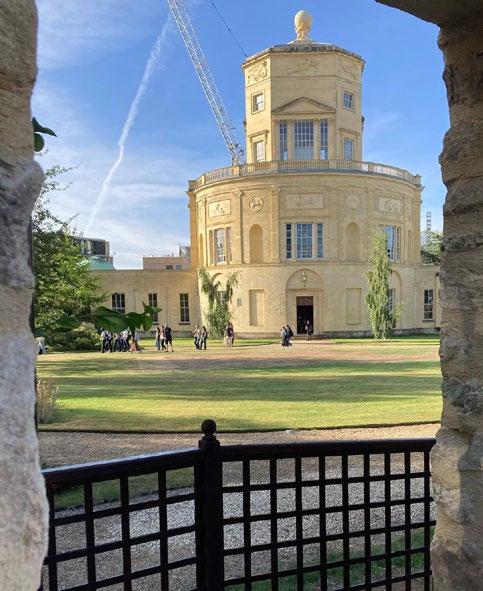

college hosted Summer School students for a second time during the long vacation as part of growing commercial business
June
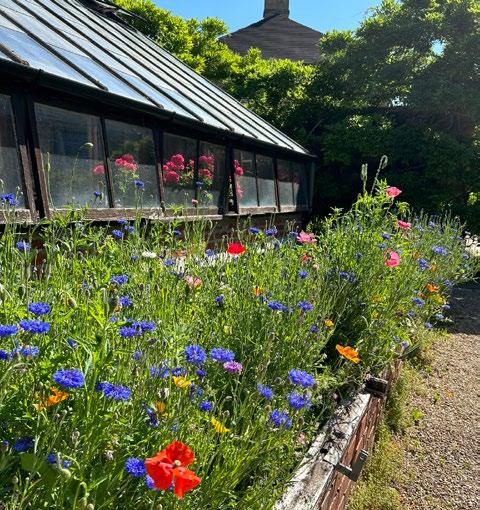

Starter at a low-carbon formal dinner during the university’s Green
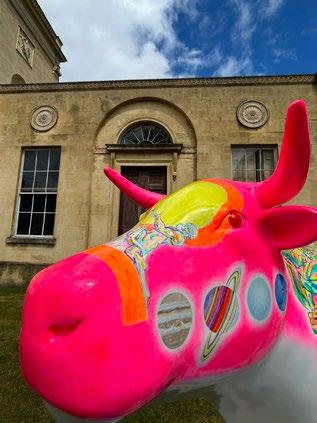
The college had its own Ox painted by Artist-in-Residence Weimin He on display throughout the summer. The Ox was a collaboration with soon-to-be new neighbours the Stephen A. Schwarzman Centre for the Humanities as part of OxTrail, an art trail around Oxfordshire to raise funds for Sobell House hospice
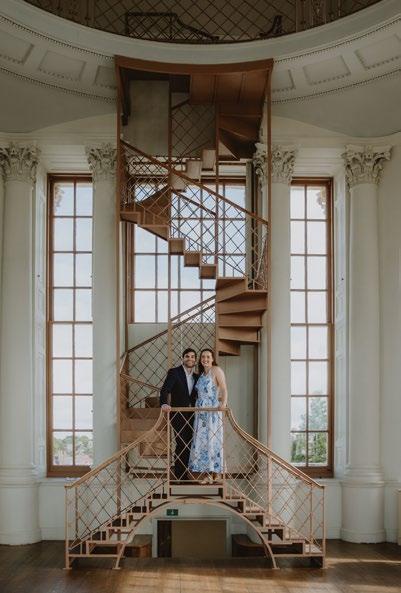
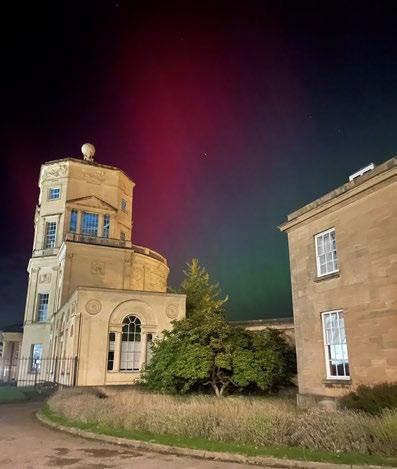
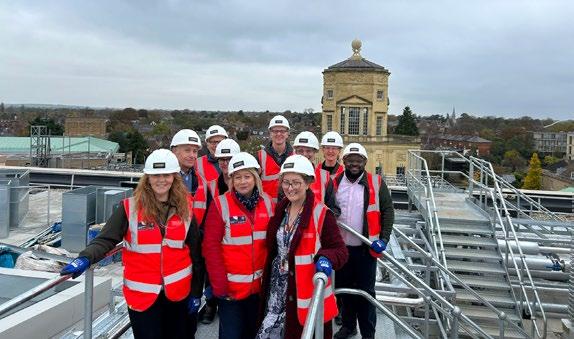


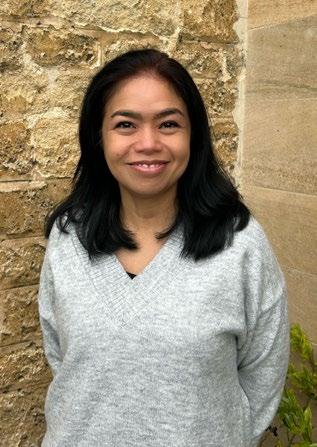
Can you tell us a little about yourself? I am from the Philippines, and I have been in the UK for 15 years. Many years ago, I somehow landed a job in Dubai, and I lived in the Middle East for over seven years, and that’s where I met my husband. I live in Berkshire with him and my son, who is at secondary school. I commute by train and enjoy the exercise I get walking to and from the station.
What led you to Green Templeton?
It has been a long and serendipitous road that got me here. Before I worked at college, I’d never worked in Oxford, never worked in a university and never worked in accommodation. It’s somewhat of a mystery to me how I did end up in college, but I’m so glad I did because I love my job. I started my career in the hotel industry and I’ve had a number of customer service jobs, which has become really useful in this role.
How do you interact with students?
There are a lot of emails going back and forth! You hear from some students a lot more than others, which is completely understandable. Coming from overseas myself, I can understand anxieties about moving somewhere new, not knowing how things work. Should they bring pots and pans? Bedding? And can they drink the tap water? Our next project is to work on our webpages – I don’t think there is such thing as too much information.
The Accommodation Services Manager is a vital point of contact for students at Green Templeton. Emirose tells us about her role, exciting new plans for accommodation in college, and life outside work.
What are your main responsibilities and challenges?
Accommodation is not rocket science. You have one room, you fill it. It sounds really simple, but the work goes into making sure that the room is not just habitable but also welcoming and ready for students to move into. We try to make our rooms and spaces feel like a home for our graduate community. If we’re doing our job right, students can focus on their studies and enjoy the Oxford experience and not have to worry about their accommodation.
You’ve been involved in a number of major renovation projects. Could you say a bit about those?
When I arrived at college, work was needed across our estate. More investment is always needed, but we have been putting a lot of work into upgrading the accommodation with the available resources.
We’ve included sustainability as a very important factor, making everything more energy efficient. For example, at Rewley Abbey Court and in our Observatory Street houses. Lockdown actually worked for us in that sense, because we had so many empty rooms, empty houses, and we were able to do a lot of the work during that time. We’re in a much better position now, but there’s still a lot to do.
The college has secured planning permission for three villas on the Woodstock Road site. How will that improve the offering?
I think what students are looking for has changed: more people now want to have an ensuite and more people want to be close to the college. They know this allows them to get support easily, and people who live on site are more engaged with the college. For both reasons, I think these new villas will make a massive difference to the students and to the college.
What's the best thing about your job?
When we get it right! It’s when students tell us that having their accommodation helped with their time in Oxford, or that it helped them through a tough time, or allowed them to focus on their studies. We joke that we only hear from students when things are going wrong, but then I have to remind myself that it’s great that I never hear from maybe 90% of students. That means there’s nothing wrong with their accommodation and that they’re happy and they are just going about life as a student at Oxford.
I used to check emails in the evenings and weekends, but now I am trying to be better at switching off. I love to visit new places, including in the UK. I’m always surprised when Brits tell me they’ve never been to Scotland or the Lake District. There are so many beautiful places in the UK that I still want to visit. But I also want to visit other countries. Besides travelling, I like to read and I can also be a binge watcher when I get going.
‘Green Templeton catalyses knowledge exchange among its community, and acts as an enabler of positive change through policy and practice across the world.
‘2025 marks a step change in our ambitions: to widen opportunity and participation, deliver an environment of excellence and achieve financial resilience.
‘I look forward to working with existing, and new, friends and partners to collectively achieve these goals.’
Michael Cook Chair, Development Committee
Green Templeton College
University of Oxford 43 Woodstock Road Oxford
OX2 6HG
United Kingdom
gtc.ox.ac.uk
facebook.com/greentempletonoxford
instagram.com/greentempleton
twitter.com/greentempleton
linkedin.com/company/green-templeton-college